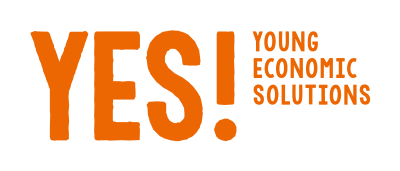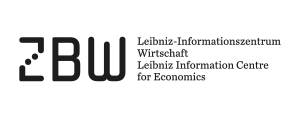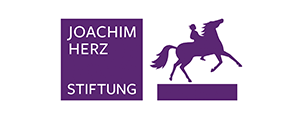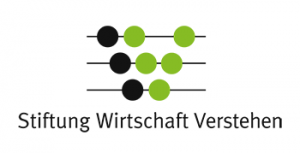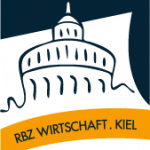2024
Das zehnte YES! feierten wir mit unseren großartigen Schulteams aus aller Welt!
YES! 2024
Das YES! Finale 2024
Am 17.09.2024 war es soweit: das Bundesfinale 2024 fand endlich statt! Jugendliche aus ganz Deutschland und darüber hinaus versammelten sich für den Höhepunkt des YES!-Wettbewerbs in der Bucerius Law School in Hamburg. Nach monatelangem Entwickeln von innovativen Lösungsstrategien waren die 13 Schulteams nun mehr als bereit, ihre Ideen zu präsentieren.

Foto: YES! – Young Economic Solutions
Erfüllt mit Vorfreude, aber auch Anspannung und Aufregung begann der erste Wettbewerbstag und die Schüler:innen trudelten pünktlich mit ihren unterstützenden Lehrkräften im Auditorium ein. Die Anspannung und Nervosität ließ sich nahezu in der Luft spüren, doch unseren beiden Moderator:innen Svenja Heber und Alexander Müschen gelang es auf Anhieb, die Stimmung aufzulockern. Neben den Schüler:innen wurden auch die geladenen Expert:innen sowie die Jury herzlich willkommen geheißen. Auch dieses Jahr meldete sich der Schirmherr des YES!, Dr. Robert Habeck, per Videobotschaft zu Wort und drückte seine Wertschätzung gegenüber all den Schulteams aus. Dass sich gerade die jüngeren Generationen mit wirtschaftlich relevanten Themen auseinandersetzen sollten und vor allem innovative, kreative und mutige Ideen zukunftsrelevant seien, machte er in seiner Botschaft besonders deutlich. Vielen Dank für die Worte, die eine perfekte Überleitung in die darauf folgenden Präsentationen waren!

Aufmerksam verfolgten die Jugendlichen die motivierenden Worte von Dr. Robert Habeck. Foto: YES! – Young Economic Solutions
Jede einzelne Präsentation wurde ergänzt durch eine 15-minütige Diskussionsrunde mit den geladenen Expert:innen. In diesen 15 Minuten konnten die Schüler:innen ihre Expertise noch einmal beweisen, in dem sie sich den Fragen der Sachkenner:innen aus unterschiedlichen Bereichen stellten. Die Expert:innenrunden waren geprägt von ausnahmslos begeistertem Feedback und Erstaunen über die hohe Qualität und die Menge an Fachwissen, das die Schüler:innen sich im letzten halben Jahr angeeignet haben. Dass dem Publikum nach den Expert:innenrunden nach wie vor Fragen unter den Nägeln brannten, zeigte sich in den jeweils anschließenden Diskussionsrunden mit allen Schüler:innen. Zehn Minuten flogen die Mikrofonwürfel durch den Hörsaal und die präsentierenden Teams stellten sich den Fragen der Mitstreiter:innen.

Das Team des Helene-Lange-Gymnasiums in der Diskussion mit Dr. Stefan Profit (Mitte) und Ulrich Weinhold (rechts). Foto: YES! – Young Economic Solutionss
Dank regelmäßiger Trink- und Snackpausen ließ die Konzentration nur selten nach und der erste Tag verging wie im Flug. Zum Abschluss stand dann noch ein Programmpunkt an: die alljährliche Barkassenfahrt! Verteilt auf drei Barkassen ließen wir alle gemeinsam den aufregenden Tag ausklingen. Auch das Wetter spielte mit: Sonnenschein und spätsommerliche Temperaturen machten es uns leicht, auch die restliche Anspannung abfallen zu lassen und miteinander abseits vom Wettbewerb ins Gespräch zu kommen.
Auch der zweite Tag war geprägt von wertschätzendem Feedback, kritischen Fragen und anregenden Tipps zu den weiteren Lösungsideen. Viele Gespräche gingen in den Pausen im Foyer weiter und wurden vertieft. Nachdem dann mittlerweile elf Schulteams präsentiert hatten und das Hauptprogramm vorüber war, ging es für alle Schüler:innen ins Foyer. Hier erwartete sie ein Pub Quiz, bei dem sich die Teams der verschiedenen Schulen mischten. Die Stimmung war gut, der Wettbewerbsgeist war weniger ernst aber dennoch intensiv und die Jugendlichen konnten sich untereinander besser kennenlernen. Es war ein bunter und lauter Ausklang für den zweiten Tag.

Sie überzeugten mit ihrer Präsentation sowohl die Jury für den Best Scientific Analysis Award und die anderen Schulteams: Das Team der Schule INSALCO Santiago de Chile. Foto: YES! – Young Economic Solutions
Am Donnerstag war es dann schon so weit: der letzte Tag des Finals stand an und ganz besonders nervös waren die beiden Schulteams, die bis zum letzten Tag auf das Präsentieren ihrer Lösungsstrategie warteten. Aber auch alle anderen Schulteams war nochmal eine Anspannung abzuspüren, denn am letzten Tag standen die Pitches an. Hier bekamen alle Teams noch einmal die Chance, innerhalb von 60 Sekunden, die Schüler:innen von ihrer innovativen Idee zu überzeugen. Da einige Teams bereits zwei Tage zuvor ihre Präsentation hielten, waren die Pitches besonders hilfreich, um erneut die Inhalte in das Gedächtnis der Schüler:innen zu holen. Denn schließlich folgte auf die Pitches der wichtige Part der Punktevergabe. Die Schulteams sind beim YES! dazu aufgefordert, die Teams eigenständig auf Basis der bekannten YES!-Kriterien zu bewerten.
Nachdem alle Schulteams ihre Wahlzettel in die YES!-Urne gesteckt hatten und die Mittagspause vorbei war, wurde es ernst, denn alle wussten: gleich werden die ersten drei Plätze verliehen.
Um die Spannung noch einen Augenblick zu erhalten, folgte vor der Bekanntgabe der Gewinner:innenteams eine Interviewrunde mit den Organisatorinnen hinter dem YES!, der Leiterin des Programmbereichs Open Economics der ZBW – Leibniz-Informationszentrum Wirtschaft Prof. Dr. Marianne Saam sowie Lillit Linhoff, Clustermanagerin des Clusters „Unternehmerisch denken und handeln“ bei der Joachim Herz Stiftung. Marianne Saam betonte die Relevanz von Wissenstransfer beim YES!, dadurch entstehe eine Brücke zwischen den Forscher:innen und den Schüler:innen, von der beide Seiten profitieren. Der Wettbewerb gebe den Jugendlichen nicht nur eine Art Werkzeugkasten an die Hand, sondern schule sie auch darin, wie man mit neuen Ideen umgeht. Zum 10. Mal fördert die Joachim Herz Stiftung das YES! und neben zahlreichen Anliegen fördert die Stiftung das YES! vor allem aufgrund des Wissenstransfers aus der Wissenschaft in die Praxis und aufgrund des intergenerationalen Lernens, so Lillit Linhoff. Sie betonte, dass während der Zusammenarbeit der Schüler:innen mit den Forscher:innen der Impact beidseitig geschehe und somit einen intergenerationalen Gewinn biete. Beide Sprecherinnen ermutigen die Schüler:innen, weiterhin mutig zu sein, Ideen weiterzuverfolgen und mit viel Freude an ihren Ideen und neuer Ideenfindung dranzubleiben. Denn Veränderung beginnt im Kleinen!

Prof. Dr. Marianne Saam (links) und Lillit Linhoff (rechts) im Interview. Foto: YES! – Young Economic Solutions
Und nun war es endlich soweit: die Verkündung der Platzierungen. Zusätzlich zu den gewählten Plätzen durch die Jugendlichen wird jedes Jahr der „Best Scientific Analysis Award“ verliehen. Die Jury, bestehend aus Wissenschaftler:innen, verleiht diesen Award an dasjenige Team, das sich aufgrund der wissenschaftlichen Ausarbeitung ihrer Idee, von allen anderen Teams abhebt. Den Preis für die beste wissenschaftliche Erarbeitung übergab die Jury an das Team der INSALCO Schule aus Santiago de Chile. ¡Felicidades!
Den vierten Platz verliehen unsere Gäste der „Stiftung Wirtschaft Verstehen“ Frau Prof. Dr. Hackenberg und Herr Dr. Empter. Beide hoben hervor, wie großartig sowohl die Präsentation als auch der Pitch vorgetragen und ausgearbeitet wurden. Herzlichen Glückwunsch an das Helene-Lange-Gymnasium aus Rendsburg mit ihrer Idee Meatless Milestones! Das Team hatte damit auf das Thema der Forscherin Robyn Blake-Rath von der Leibniz Universität Hannover aufgebaut.
Auf den 3. Platz wählten die Schüler:innen das Team der Deutschen Berufsschule Hong Kong. In Zusammenarbeit mit Herrn Dr. Mark A. Andor und Herrn Dr. Lukas Tomberg vom Leibniz-Institut für Wirtschaftsforschung (RWI) entwickelten sie ihre Idee der Ecomiles.

Erfreute Gesichter des Teams der Deutschen Berufsschule Hong Kong über einen Platz auf dem Treppchen. Foto: YES! – Young Economic Solutions
Der 2. Platz ging an das Annette-Kolb-Gymnasium aus Traunstein. Das Team konnte mit ihrem Tag der Pflege einen Großteil der Schüler:innen überzeugen. Unterstützt wurden sie bei ihrer Ideenentwicklung von Frau Dr. Monika Senghaas vom Institut für Arbeitsmarkt- und Berufsforschung der Bundesagentur für Arbeit (IAB).

Sie versprachen, ihre Idee vom „Tag der Pflege“ im kommenden Jahr in der Praxis auszuprobieren. Foto: YES! – Young Economic Solutions
Auf den 1. Platz des diesjährigen Yes!-Wettbewerbs wählten die Schüler:innen das Schulteam der INSALCO Schule aus Santiago de Chile. Ihr Kartenspiel CAPITAL MASTERS – Wer trifft die richtige Wahl? entwickelte das Team in Zusammenarbeit mit Frau Menglu Neupert-Zhuang von der Frankfurt School of Finance & Management.
Zum allerersten Mal gewann ein Team gleich zwei Preise! Das INSALCO-Team überzeugte also nicht nur die Jury für den Best Scientific Analysis Award, sondern auch alle Schüler:innen.

Die Abräumer des Finales vom Team INSALCO aus Santiago de Chile. Foto: YES! – Young Economic Solutions
Bevor wir uns alle für einen gebührenden Ausklang zum Empfang versammelten, war es noch an der Zeit, Danke zu sagen. Wir als YES!-Team freuen uns über ein wunderbares Jahr mit tollen Schüler:innen, Lehrkräften, Forscher:innen, Partner:innen und Expert:innen. Danke deshalb auch auf diesem Wege an alle Beteiligten des YES! 2024.

2023
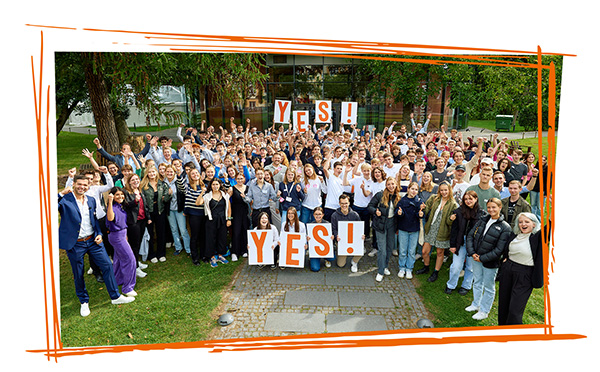
Ein volles Haus ohne jegliche Corona-Beschränkungen durften wir 2023 begrüßen.
YES! 2023
Das YES! Bundesfinale 2023
„Eine Afterparty bitte.“ Das war einer der Wünsche der diesjährigen YES!-Teams für zukünftige Veranstaltungen. Planungen und Reisezeiten mal ausgenommen: Diesen Wunsch können wir gut verstehen, denn Grund zum Feiern gibt es auf jeden Fall nach dem YES! Bundesfinale.
Drei Tage lang war das Auditorium der Bucerius Law School in Hamburg ein Marktplatz für Ideen der Zukunft. 17 Teams präsentierten ihre Lösungsideen für aktuelle Herausforderungen und diskutierten miteinander und mit geladenen Expert:innen jedes Detail der Ideen.
Am Montag, den 18. September stand erstmal das Kennenlernen auf dem Programm. Die rund 160 Jugendlichen wurden wild gemischt und kamen bei einem BINGO ins Gespräch. Der Lautstärkepegel im Foyer des Auditoriums war hoch und der Vorfreude auf die Ideen der anderen Teams bereits spürbar.
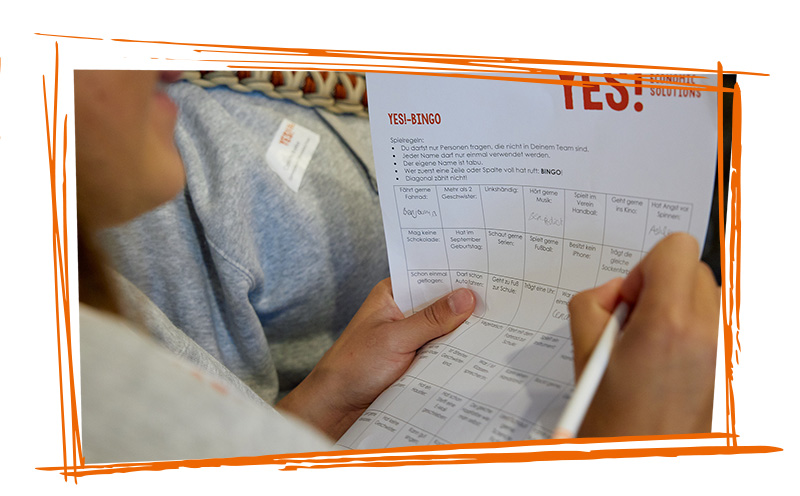
Und schon kannten sich viele Schüler:innen binnen kürzester Zeit mit Namen. Foto: YES! – Young Economic Solutions
Leuchtende Augen waren bei den Jugendlichen zu sehen, als dann endlich die Einstiegsmusik zum YES! Bundesfinale lief und alle ihre Plätze im Auditorium fanden. Julia Freistedt und Alex Müschen begrüßten als Moderationsteam unsere Gäste und übergaben das Wort direkt an den Bundeswirtschaftsminister Dr. Robert Habeck, der sich als Schirmherr des YES! per Videobotschaft an die Teams wandte.
Während viele Schüler:innen keine Minute als unbedingt nötig in der Schule verbringen möchten, so Habeck, handele es sich bei den YES!-Teilnehmer:innen offensichtlich um besonders engagierte und interessierte Jugendliche. Er lobte die Teams für ihre vielfältigen Ideen, von denen unsere Gesellschaft profitieren könnte. „Seid unbequem.“ So forderte der Wirtschaftsminister die Schulteams dazu auf, weiterhin Fragen zu stellen, interessiert zu bleiben und sich einzumischen.
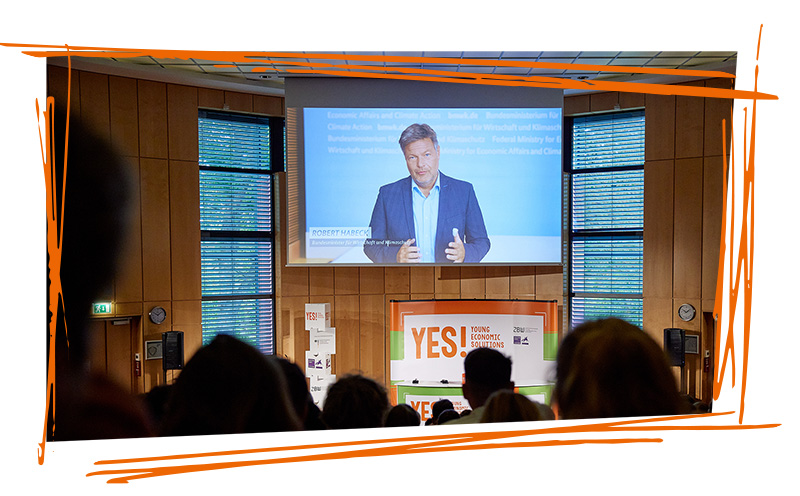
Hoher (virtueller) Besuch aus Berlin. Foto: YES! – Young Economic Solutions
Dieser Aufruf wurde anschließend durch die Verantwortlichen hinter dem YES! verstärkt. Prof. Dr. Marianne Saam, Leiterin des Programmbereichs Open Economics der ZBW – Leibniz-Informationszentrum Wirtschaft und Dr. Wolf Prieß, Leiter des Bereichs Wirtschaft bei der Joachim Herz Stiftung, sprachen in einer Interviewrunde über die Motivation hinter dem YES!.
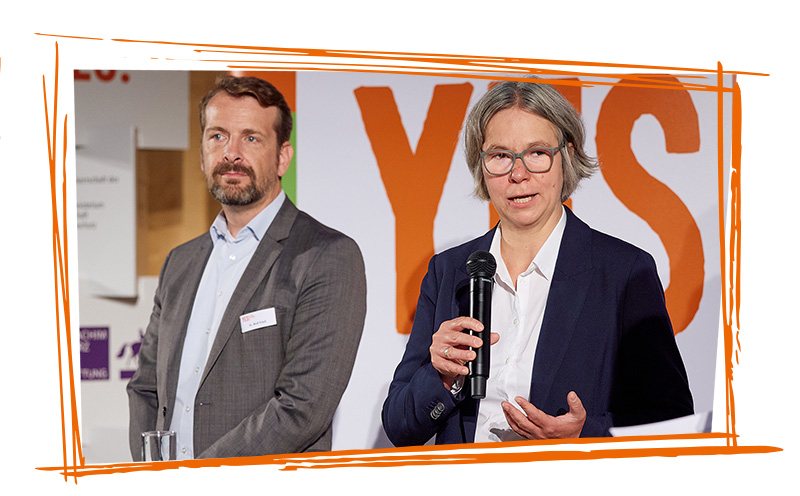
Ein bekanntes Duo auf der YES!-Bühne. Dr. Wolf Prieß und Prof. Dr. Marianne Saam. Foto: YES! – Young Economic Solutions
Der Programmbereich Open Economics an der ZBW verfolgt unter der Leitung von Marianne Saam das Ziel, wirtschaftswissenschaftliche Forschung zugänglich zu machen. Im YES! geschehe das, so Marianne Saam, indem die Jugendlichen durch unsere Lernmodule eine Toolbox für eigenes Forschen erhalten und gleichzeitig durch die gemeinsame Arbeit mit erfahrenen Forscher:innen Informationen und Ansätze für aktuelle Forschungsfragen erarbeiten.
Wolf Prieß, der seit Beginn des YES! dabei ist, zeigte auf, dass das YES! so auch die Anliegen der Joachim Herz Stiftung wie die ökonomische Bildung fördert. Seiner Meinung nach brauche es das YES! und vergleichbare Angebote, um Jugendliche und Forscher:innen zusammen zu bringen. So würde die Kreativität junger Menschen schon früh in wissenschaftliche Bahnen gelenkt und sie könnten fundiert und langfristig Einfluss auf die Gesellschaft der Zukunft nehmen.
Bei den folgenden Präsentationen wurde deutlich, dass genau das in den sechs Monaten passiert war: Die Ideen der Jugendlichen waren durchdacht, wissenschaftlich fundiert und zeigten kreative Wege auf.
Im Anschluss an jede Präsentation gab es eine zweiteilige Diskussion. Zuerst hat jedes Team für 15 Minuten mit jeweils zwei geladenen Expert:innen aus Wirtschaft, Politik oder Zivilgesellschaft diskutiert. Anschließend waren zehn Minuten Zeit für die Fragen der anderen Schulteams.
Die Diskussionen mit den Expert:innen zeigten vor allem die viele Stärken der 17 Ideen auf. Hier standen Erwachsene auf der Bühne, die durch ihren beruflichen Hintergrund reichlich Erfahrung und Fachwissen für die jeweiligen Themen mitbrachten. In erster Linie waren sie aber beeindruckt von den jungen Menschen, die ohne jahrelange Erfahrung zu Nachwuchs-Expert:innen geworden sind. Neben Lob und konstruktiven Rückfragen gaben die Expert:innen den Teams auch Tipps für die nächsten Schritte und die Vernetzungen ihrer Ideen mit.
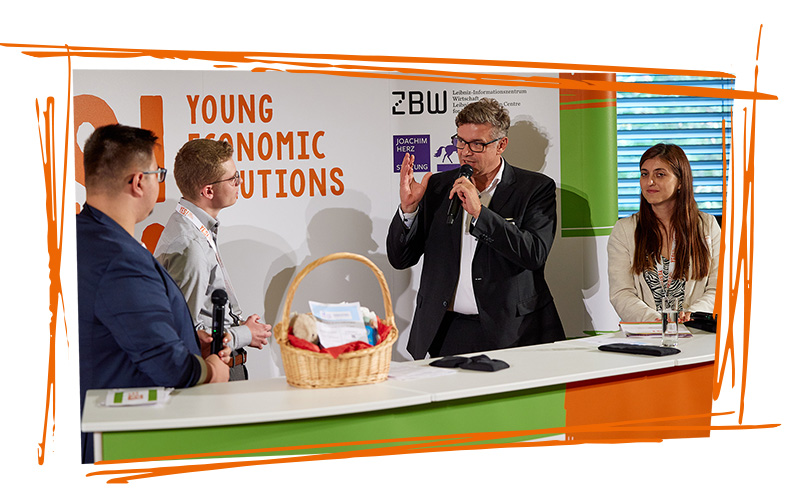
Unsere Expert:innen Dr. Yonca Dege und Dr. Stefan Profit im Gespräch mit dem Team von Ortenburg Gymnasium aus Oberviechtach in Bayern. Foto: YES! – Young Economic Solutions
Oft war es der zweite Teil der Diskussion, in dem die deutlich kritischeren Fragen gestellt wurden. Die Jugendlichen ergriffen die Chance, anhand der YES! Kriterien (Innovation, Umsetzbarkeit, wissenschaftliche Ausarbeitung und Potenzial) jede Idee genau unter die Lupe zu nehmen. Die YES!-Mikrofonwürfel flogen durchs Auditorium und meistens reichten die zehn Minuten den Teams kaum aus, um alle Fragen zu besprechen.
Dafür boten die Pausenzeiten und das Abendprogramm am Dienstag die Gelegenheit, Gespräche weiterzuführen. Bei einer Barkassenfahrt durch den Hamburger Hafen tauschten die Jugendlichen sich neben dem Sightseeing weiter über ihre Ideen und vieles mehr aus.
Nach 17 Runden war es dann am Mittwochvormittag soweit und die Pitch-Runde begann. In einer Minute fassten die Teams hier nochmal ihre Idee zusammen und versuchten, möglichst viele Stimmen für sich zu gewinnen. 17 Mal hörten wir souveräne und durchdachte Pitches, die alle Ideen nochmal frisch in Erinnerung riefen.
Während die Teams anschließend die Köpfe zusammensteckten, um ihre Wahlentscheidung zu treffen, beriet sich auch die wissenschaftliche Jury. Die Platzierungen im YES! werden ganz bewusst durch die Jugendlichen selbst bestimmt. Zusätzlich vergeben wir den „Best Scientific Analysis Award“, der – wie der Name schon sagt – die beste wissenschaftliche Ausarbeitung belohnt. Über diesen Award entscheidet eine Jury aus Wissenschaftler:innen.
Und genau dieser Preis wurde auch als erstes vergeben. Er ging in diesem Jahr an das Team vom Gymnasium bei St. Michael in Schwäbisch Hall. Ihre Idee Cash Coach – Unlock your financial potential entwickelten sie aufgrund der Themeneinreichung von Marius Cziriak, ZEW – Leibniz-Zentrum für Europäische Wirtschaftsforschung, und Manuel Vogler, Universität Mannheim.
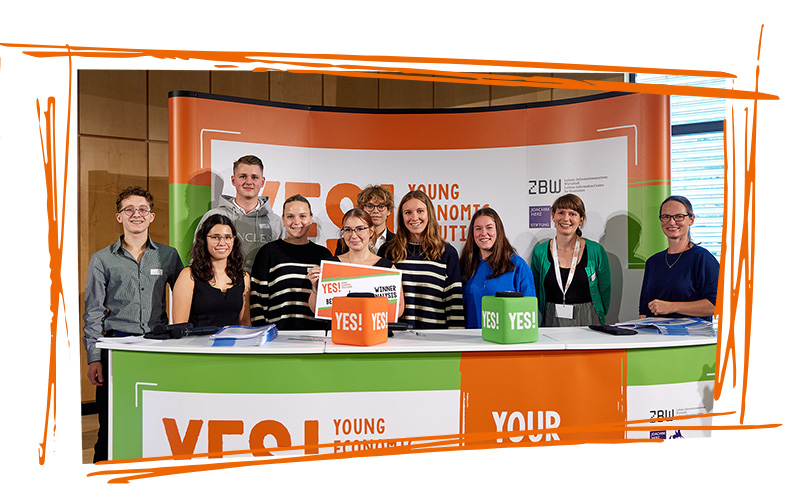
Das Team des Gymnasiums bei St. Michael mit Juliane Stein-Zalai (2. v. l.) aus der Jury und Dr. Nicole Waidlein, Chefredakteurin vom Wirtschaftsdienst und Intereconomics. Foto: YES! – Young Economic Solutions
Der Internationale 1. Platz unter unseren drei US-Teams ging an die German International School New York. Sie hatten mit Prof. Dr. Hanjo Hamann und Prof. Dr. Paul Pronobis von der EBS Universität für Wirtschaft und Recht zusammengearbeitet. Dabei entwickelten sie die Idee: CHECK YOUR CHAIN – Lieferketten im Blick.
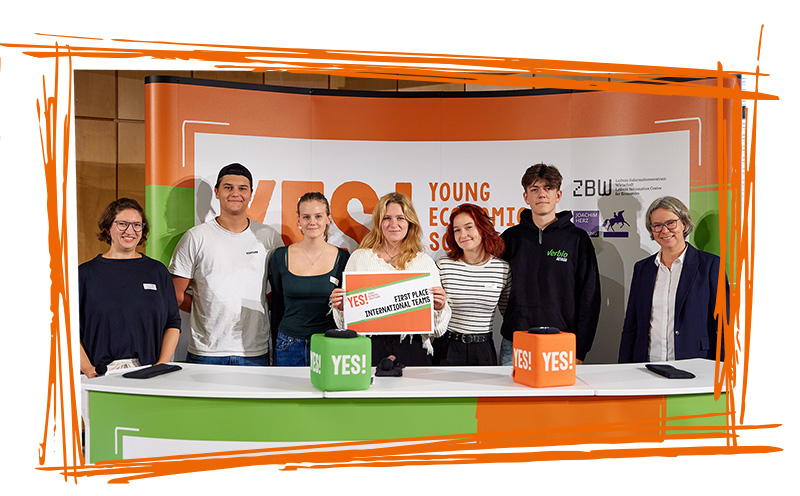
Das Team der German International School New York mit Dr. Simone Gobien von der Joachim Herz Stiftung (links) und Prof. Dr. Marianne Saam (rechts). Foto: YES! – Young Economic Solutions
Auf Platz drei wählten die Schulteams die Idee Tierwohl durch Aufklärung – Schluss mit Qualzucht und Tierleid, die gemeinsam vom Team des Helene-Lange-Gymnasiums in Rendsburg und den Forscherinnenn Anette Ruml, Lisa Hoffmann und Katharina Fietz vom GIGA – Leibniz-Institut für Globale und Regionale Studien erarbeitet wurde.
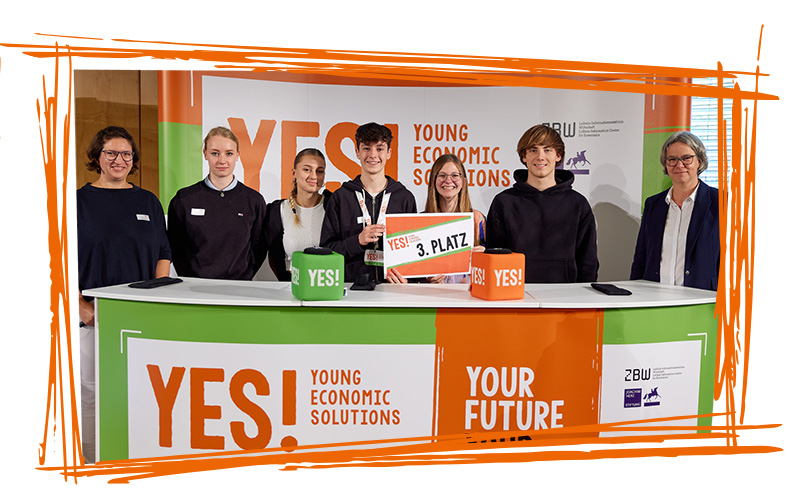
Sie wollen die Menschen aufrütteln, Fleischprodukte aus besserer statt schlechter Tierhaltung zu kaufen: Das Team des Helene-Lange-Gymnasiums Rendsburg. Foto: YES! – Young Economic Solutions
Zum ersten Mal in der Geschichte des YES! landete ein Thema zwei Mal auf dem Treppchen. Dr. Ignat Stepanok vom Institut für Arbeitsmarkt- und Berufsforschung (IAB) hatte folgende Fragestellung in das YES! eingebracht: Lieferketten und Lieferengpässe – Wie können Betriebe auf die globale Krise reagieren und ihre Wettbewerbsfähigkeit erhalten?
Zwei Teams haben im letzten halben Jahr dieses Thema bearbeitet und mit ihren ganz unterschiedlichen Lösungsideen die Plätze 1 und 2 belegt.
Zweitplatziert war das Team des Gymnasiums Leopoldinum aus Passau mit der Idee Pharmafinder – schneller finden, was du brauchst!
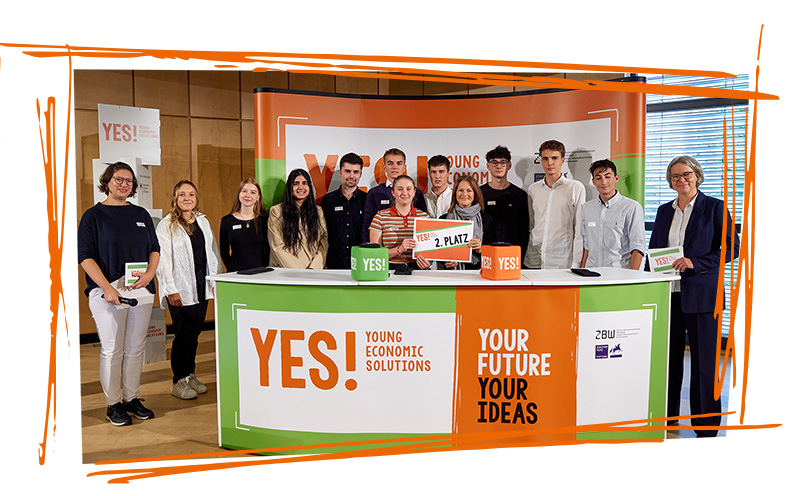
Dem Team des Leopoldinums aus Passau ging es um eine transparentere Verfügbarkeit von Medikamenten. Foto: YES! – Young Economic Solutions
Auf den ersten Platz des YES! 2023 wählten die Jugendlichen das Team der Deutschen Berufsschule Hong Kong mit der Idee SeaShare – dream big, share cargo!
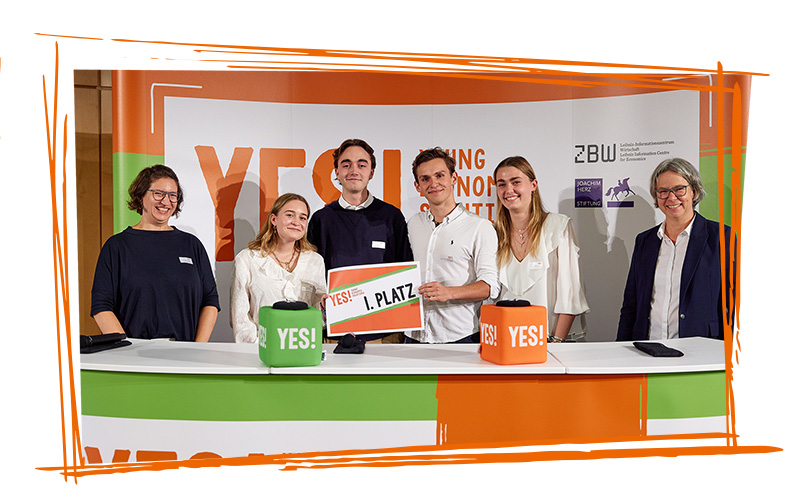
Von Asien nach Deutschland und zurück. Ihre Idee, freie und halbleere Container besser aufzufüllen kam bei den anderen Teams am besten an. Und das Team der Deutschen Berufsschule Hongkong kehrt mit dem ersten Platz zurück. Foto: YES! – Young Economic Solutions
„Wir sind unfassbar stolz auf euch.“, sagte Andrea Schmidt, Projektleiterin des YES! den Teams zum Schluss. Das YES! 2023 war für sie besonders von Zusammenarbeit geprägt: „Gemeinsam mit den unersetzbaren Forscher:innen dürfen wir Jugendliche begleiten, die oft ihre ersten Schritte im wissenschaftlichen Arbeiten machen. Wir sind den Lehrkräften, den kooperierenden Instituten und allen Unterstützer:innen so dankbar, dass sie das YES! auch in diesem Jahr möglich gemacht haben. Mit so einem Netzwerk können wir den Jugendlichen und ihren Ideen gebührend eine Werkstatt und eine Bühne bieten.“
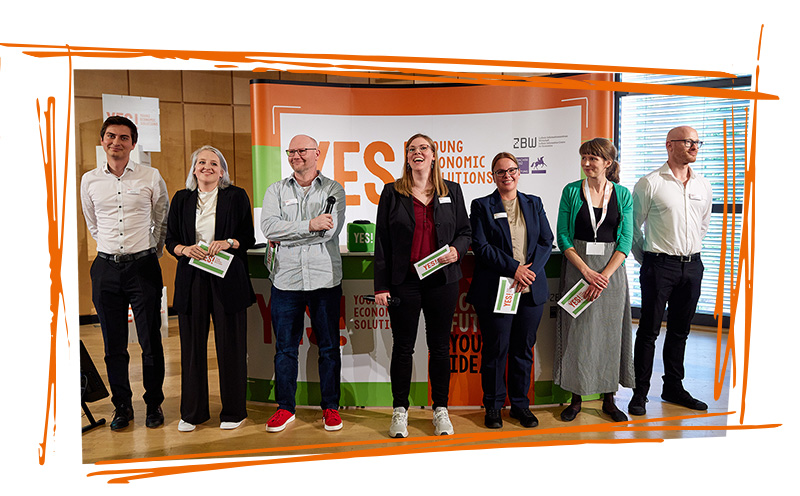
Felix, Bente, Jochen, Andrea, Stefanie, Juliane und Dimi (v.l) – das sind wir, das YES!-Team – glücklich über eine gelungene Veranstaltung und ein großartiges Jahr ohne Masken umgeben von unseren Jugendlichen. Foto: YES! – Young Economic Solutions
Abschließend lud Andrea die Teams, Lehrkräfte, Jury, Expert:innnen und alle weiteren Gäste zum Empfang ein. Starke Lösungsideen, engagierte Jugendliche und drei Tage bunte Veranstaltung. Darin lagen viele Gründe zum Feiern.
DANKE!
Das YES!-Team
2022
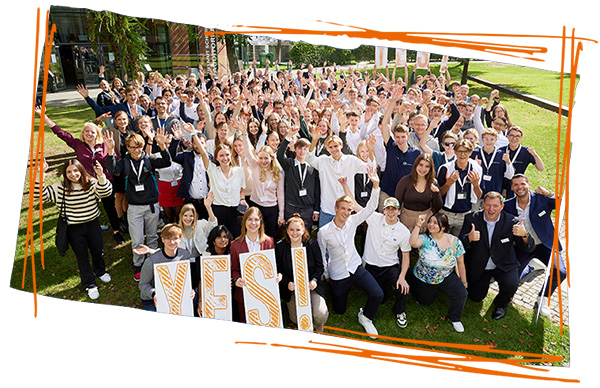
Endlich durften wir nach zwei Jahren wieder die Schulteams in den Regionen begrüßen und gemeinsam mit Teams aus UK und den USA unser großes Finale in Hamburg erleben.
YES! 2022
Finale 2022

Die Teams des Finales 2022. Foto: YES! – Young Economic Solutions
For the first time after two digital years, roughly 130 students from three countries came together in Hamburg to present and discuss their ideas on current issues – that was an opportunity we have all been longing for.
The YES! 2022 Final took place from 19-21 September. After 18 rounds of presentations, discussions with experts and among the students, all teams voted and selected their winners on Wednesday afternoon.
Picture this: A group of about ten teenagers are standing together. All with backpacks and suitcases at their feet, jackets already put on. A few boys from the UK are putting their school-uniform ties and jackets on the German students. They are laughing and posing for pictures together. Two teachers are watching the scene from a few metres to the side: „They just don’t want to leave.“
These were just some of the new friendships formed over a three-day event. Most of their conversations started because of the topics the school teams had been working on for the last few months. Every team presented research, ideas and solutions that kicked off intense discussions. After fifteen minutes with our invited experts, all students in the auditorium posed their questions for the next ten minutes. However, these time slots never seemed to be enough. The discussions continued during every break and bit of free time when the teams sought each other out.
The scene had looked slightly different on Monday morning. 130 students and their teachers arrived at the Bucerius Law School in Hamburg. They had travelled from all over Germany, from the UK and US. There was a mix of tension and excitement in the air as everyone settled in. Our two hosts, Alexander Müschen and David Patrician, quickly made the auditorium feel like home. They managed to make even the slightly jet-lagged participants in the room feel energised and ready.
First came a short round of interviews with representatives of the co-organisers of the YES!. Dr. Nina Lemmens, member of the executive board of the Joachim Herz Foundation and Prof. Dr. Marianne Saam, Head of Knowledge Transfer Economics at the ZBW – Leibniz Information Centre for Economics. They congratulated the finalists and posed two challenges:
Dr. Lemmens gave insight into the foundation’s key motivation for supporting the YES!: Furthering economic education. She hopes that the insights the teams had gained into science and research would further their curiosity, appetite for education and enable them to fulfil their dreams. Her challenge: “Use what you have learned and keep it going by exploring science-based occupations or starting your own companies.”
Prof. Dr. Saam emphasised the students’ unique perspective due to the fact that they weren’t yet confined to the bureaucratic challenges of work-life. It is her hope that through the YES! the machine room of research was opened up for the teams. She encouraged the young people to pursue economic and social sciences and challenged especially the girls in the room: “I hope to see one or more of you a professor of economics one day!”
Afterwards, the challenges became much more immediate: Our 18 presentations began. You could tell that these young people had come prepared. They were now experts on the topics they had been researching for the past months. No matter how nervous, they held assured, impassioned and inspiring talks. They confidently discussed their proposed solutions’ potential and shortcomings with decision-makers, experts, and the other students. You can read about all the finalist topics here.
On Tuesday, the teams received a boost of motivation from Dr. Stefan Profit. He is the Deputy Director-General of the Economic Policy Department within the German Federal Ministry of Economic Affairs and Climate Action, under whose patronage the YES! stands: “The Ministry has supported YES! for years, and it’s one of the best investments we’ve made. You, students, have been digging into topics with your researchers and teachers. This experience and collaboration will be worth more than you may think. My thanks goes to you students at the heart of the YES! and to your teachers, the researchers and organisers.”
The collaboration among school teams and their supporting researchers was evident during the whole event. The teams gave shout-outs to their mentors and enjoyed the opportunity to meet some of them in person and even explore Hamburg together in the evenings. One such occasion was a boat tour through the port of Hamburg. The salty breeze was a great refreshment after the intense hours spent listening, discussing, presenting and making new friends.
Alas, every great thing must come to an end: After 18 one-minute pitches to remind everybody of all the presentations, the students voted. They applied the criteria that had shaped their own YES! projects: The clear identifications of a problem, the scientific approach to a solution and the innovation, feasibility and effect of said solution.
While the students’ votes were counted, our scientific jury rewarded the Best Scientific Analysis Award. This award is given to the team standing out because of the quality of their scientific research and an evidence-backed solution. This year’s recipient of the award is the St. Raphael Gymnasium from Heidelberg with their idea “Bring the public back into public procurement!”
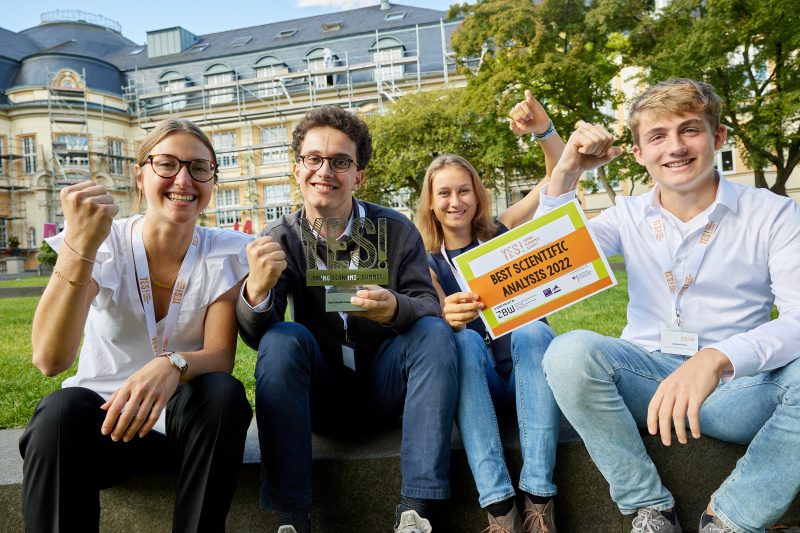
The team of St. Raphael Gymnasium fromHeidelberg
Among our five international teams, the students voted for the initiative “Migration Education for the Misinformed Nation” from Sheffield Girls’ Sixth Form. This international collaboration within our YES! BRIDGE project was made possible with help from the German Federal Ministry of Education and Science and the Royal Economic Society of the UK.
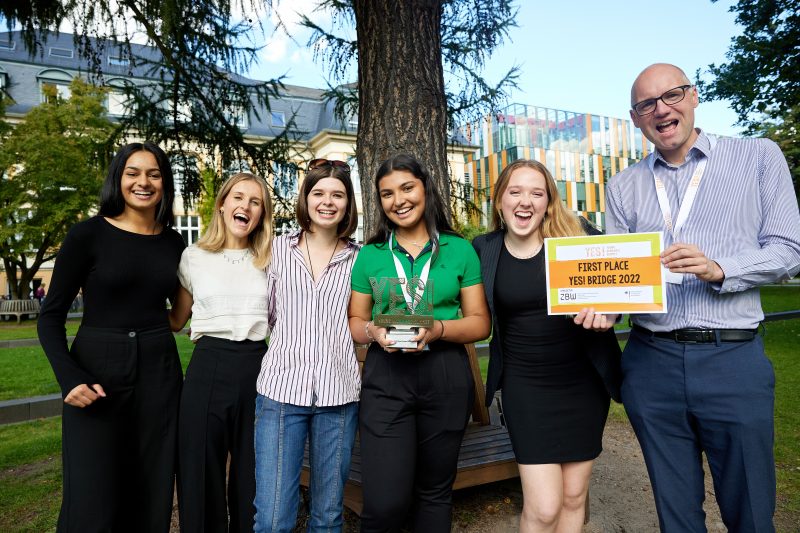
The winning team of our international competition: the team from Sheffield Girl’s Sixth Form
Sam McLoughlin, campaign manager for Discover Economics within the Royal Economic Society joined us in Hamburg and called the YES! a “truly life-changing experience for all involved”. He went on: “It was so inspiring to see young people from a variety of backgrounds come together to tackle the real economic problems in today’s society. Not only does this give young people an opportunity to voice their opinions and share unique solutions, but it provides a platform for them all to have exciting futures. It was a pleasure to coordinate the UK activity on behalf of Discover Economics – The Royal Economic Society and to work with the great YES! Team.”
“Spending three days together at the YES! Final transformed a group of 18 different school teams from Germany, the UK and the USA into one large group of students who treated each other with great respect for their work,” added Jochen Bast, project manager at the YES! team and co-coordinator of the YES! Bridge project. “And yet, they all learned how different problems and solutions can look in various countries. One question kept popping up: “How can your solution work in my country?” That’s how inspiration works!“
Third place among the German teams went to the Gymnasium Buckhorn Hamburg with their idea UseH2 for more sustainable air travel.
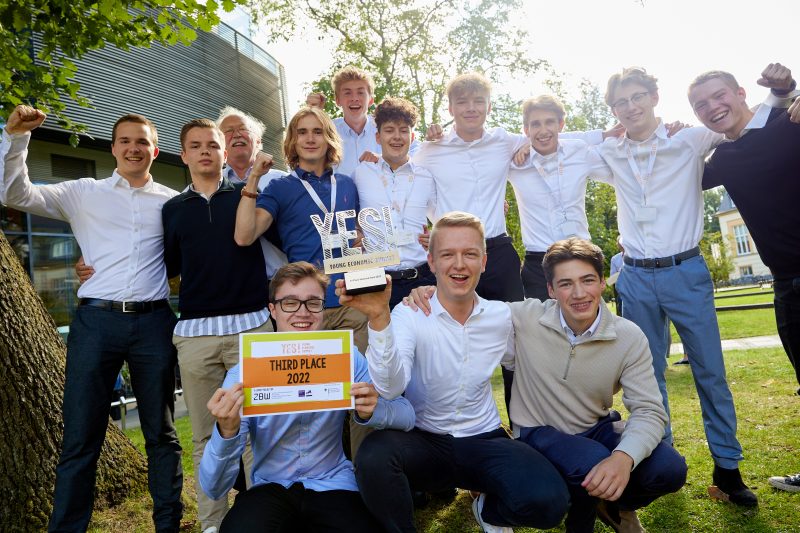
The Team of the Gymnasium Buckhorn from Hamburg
In second place: GreenChoice – a proposal for lowering the CO2 footprint of meals in canteens by the Gymnasium der Schulstiftung Seligenthal.
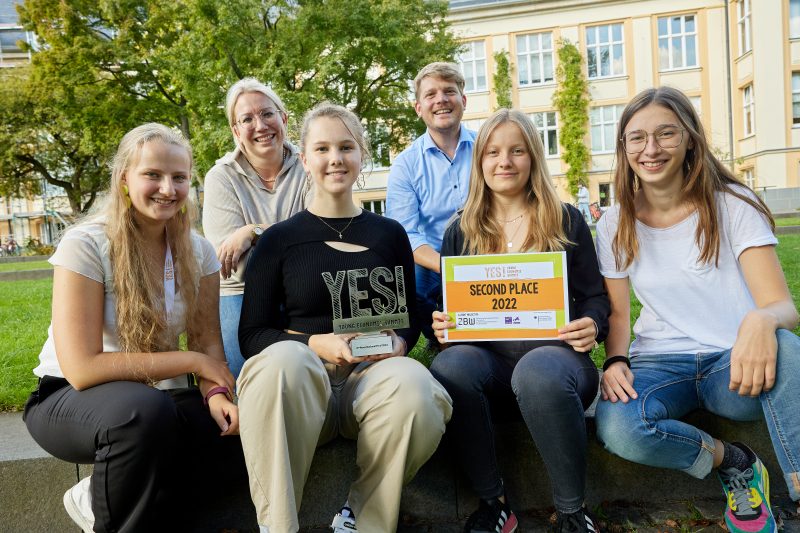
In second place, the team of the Gymnasium der Schulstiftung Seligenthal
The first place of the YES! 2022 was awarded to the Gymnasium Martineum Halberstadt and their idea: INSIGHT – Transparency. Privacy. Insight. Developed as an answer to the topic “If it costs nothing, you are the product – how does that change us and how can we change that?” which was posed by Maximilian Müller from the ESMT Berlin.
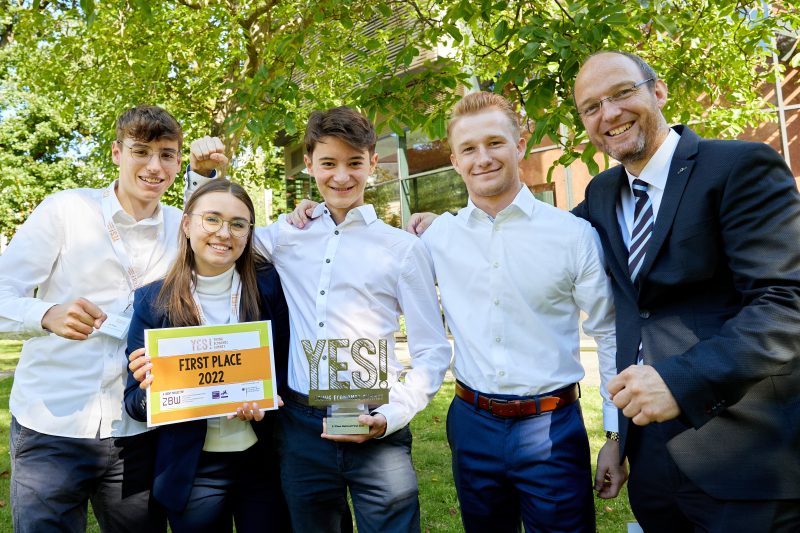
The winning team of the Gymnasium Martineum from Halberstadt.
Of course, in the end, there were excited and overwhelmed winners and a few tears of joy as well as a few teas of disappointment, which only spoke to the great dedication the young people had approached this competition with.
After drying all kinds of tears, everyone came together for a final reception and celebrated what they all had achieved. The goodbyes lasted for a long time, as students, teachers, researchers and experts had all had intense and unique conversations and experiences that nobody really wanted to let go of.
As the YES!-Team behind this event, we were simply delighted with the knowledge, passion, dedication and fun that all participants brought to the YES! 2022. We look forward to celebrating the winning teams once more at our awards ceremony in Berlin this December.
Until then we will keep rolling up our sleeves and prepare everything for the YES! 2023. If you or someone you know could be interested, please visit our page for more information and the chance to apply to next year’s YES!
Your YES! team
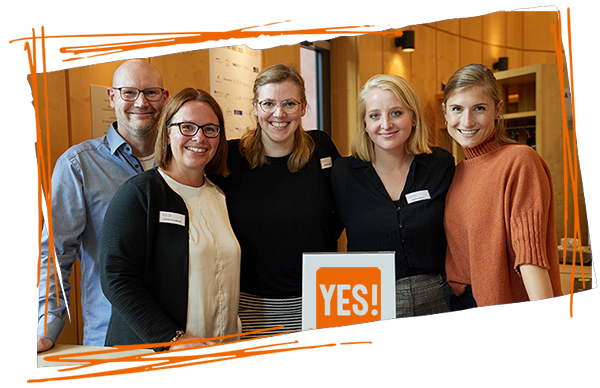
Jochen Bast, Stefanie Krambeck, Andrea Schmidt, Bente Rathjen and Svea Kreutz from the YES!-Team (left to right)
2021
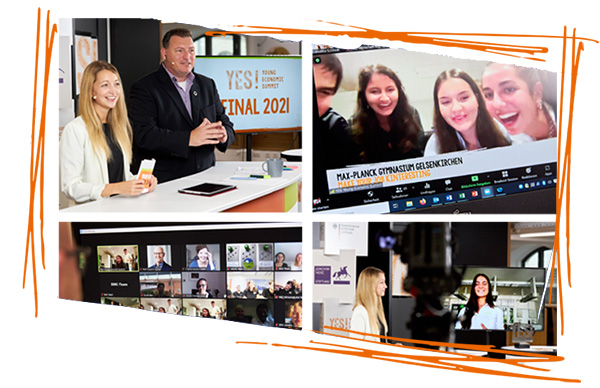 Unser zweites Corona-Jahr war etwas anders als 2021. Mittlerweile waren wir in einer digitalen Routine angekommen, aber erlebten ein Finale wie in einem TV-Studio.
Unser zweites Corona-Jahr war etwas anders als 2021. Mittlerweile waren wir in einer digitalen Routine angekommen, aber erlebten ein Finale wie in einem TV-Studio.
Unser Jahresrückblick
Unser Jahresrückblick
Frei nach dem Motto „Bleibt alles anders“ fand das Jahr 2021 seinen YES!-Höhepunkt in einem digitalen Finale, das in vielerlei Hinsicht mit dem vom 2020 nicht zu vergleichen war.
Und auch die Liste der Gewinnerteams war gespickt mit neuen Namen. Den ersten Platz belegte das Max-Planck-Gymnasium aus Gelsenkirchen gefolgt vom Annette-Kolb-Gymnasium aus Traunstein. Auf Platz drei kam das Albert-Einstein-Gymnasium aus Frankenthal. Gleich zwei Preisträger, weil die Jury sie so bemerkenswert gut fand, wurden mit dem „Best Scientific Analysis“- Award ausgezeichnet: Das Landschulheim Grovesmühle und die Deutsche Berufsschule Hong Kong. International waren sieben Teams vertreten. Die beste Lösung präsentierte in dieser Gruppe die South Forsyth High School aus Cummings, Georgia, USA.
2021 war für uns vom YES! eine große Wundertüte. Würden sich die Lehrkräfte inmitten einer Pandemie den Aufwand eines Schulwettbewerbs wie dem YES! zutrauen? Immerhin war ein gutes Drittel während der ersten Corona-Welle aus dem YES! 2020 ausgestiegen. Als dann im Dezember beim Anmeldeschluss mehr als 60 Teams registriert waren, wussten wir, dass auf uns ein volles Programm warten würde.
Trotz zweiter und dritter Welle blieben uns fast alle Teams treu. Sie organisierten sich im zweiten Schullockdown online und bereiteten sich auf ihre Regionalfinale vor, teilweise ohne sich auch nur einmal als Gruppe treffen zu können.
In unseren vier Regionalfinalen setzten sich dann 12 Teams durch. Beim Finale wurden diese dann von zwei Teams aus Großbritannien und drei aus den USA ergänzt. Das war schon einmal ein kleiner Vorgeschmack auf YES! Bridge, unseren Wettbewerb, den wir 2022 mit fünf Teams auf der britischen Insel durchführen wollen.
Live aus dem Studio
Um dem diesjährigen Finale einen besonderen Touch zu verleihen, bauten wir ein kleines Fernsehstudio auf, von dem aus unser Moderationsteam Svenja Heber und David Patrician die Teams und die Sprecher:innen begrüßte.
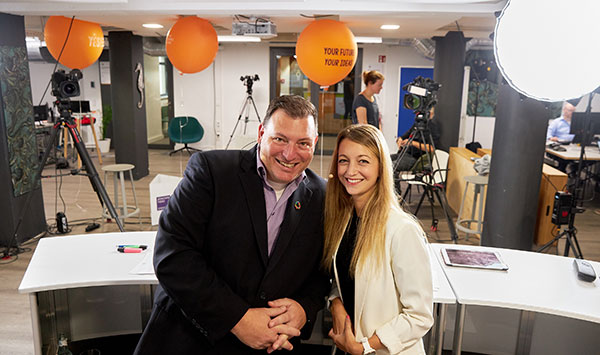
Unsere Moderationsteam Svenja Heber und David Patrician und ein Blick hinter die Kulissen. Foto: YES!
Mit großem Aufwand – einem Graphic Recorder, einer kompletten Produktionscrew und deren Hund Sally – haben wir dann an drei Tagen 17 Teams mit 38 Sprecher:innen ins Programm integriert. Lösungsideen reichten von einem neuartigen Transportnetzwerk in städtischen Randgebiete über ein hybrides Spiel zu Finanzen bis hin zu Ideen rund um die gerechte Verteilung von Schulessen an Kinder, die dies aus finanziellen Gründen benötigen.
Unsere Sprecher:innen stammten aus 10 Ländern und kamen aus verschiedenen Bundesministerien und -agenturen, der Europäischen Kommission, der OECD, NGOs, der freien Wirtschaft und Hochschulen.
Mehr Aufklärung für Geothermie
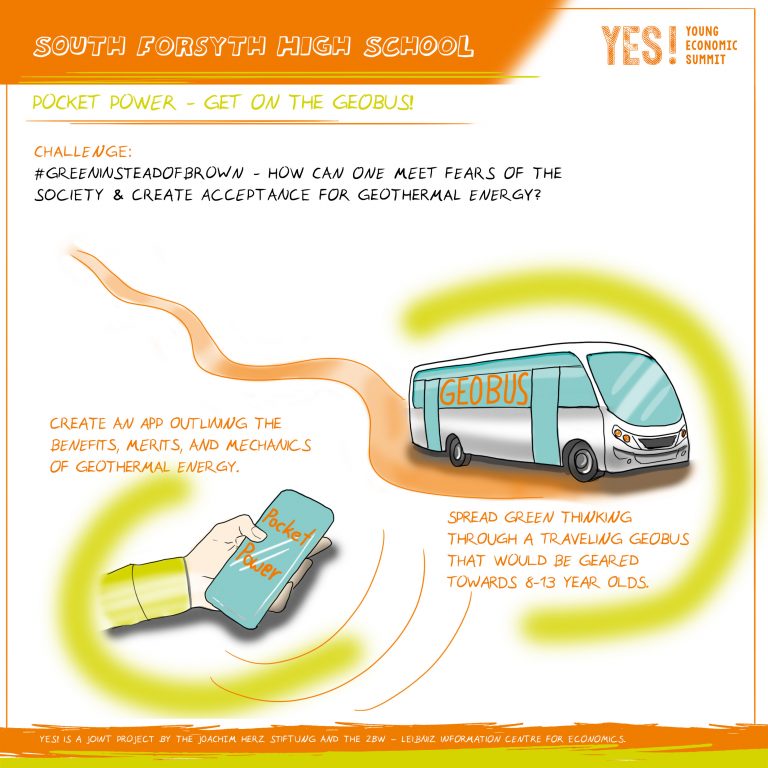
Den ersten Platz unter den internationalen Teams erreichte das Team der South Forsyth High School aus Cummings, Georgia, USA. Ihre Herausforderung lautete „#greeninsteadofbrown – How can one meet the fears of society & create acceptance for geothermal energy?“ und wurde von Tabea Schröder und Markus Waldvogel von der RWTH Aachen University gestellt. Als Grundlage führte das Team zunächst eine Umfrage im Schulumfeld durch und entwickelte daraus eine Informationskampagne, mit der sie an Jugendliche herantreten wollen. Ihr „GeoBus“ sollte an Schulen fahren und dort schon im frühen Alter auf die Chancen von Geothermie aufmerksam machen. Ältere Generationen sollen mit einer App die Chance haben, sich über Geothermie und ihre Möglichkeiten zu informieren.
Aufklärung auch für Pflegeberufe und eine Steuer-Lotterie
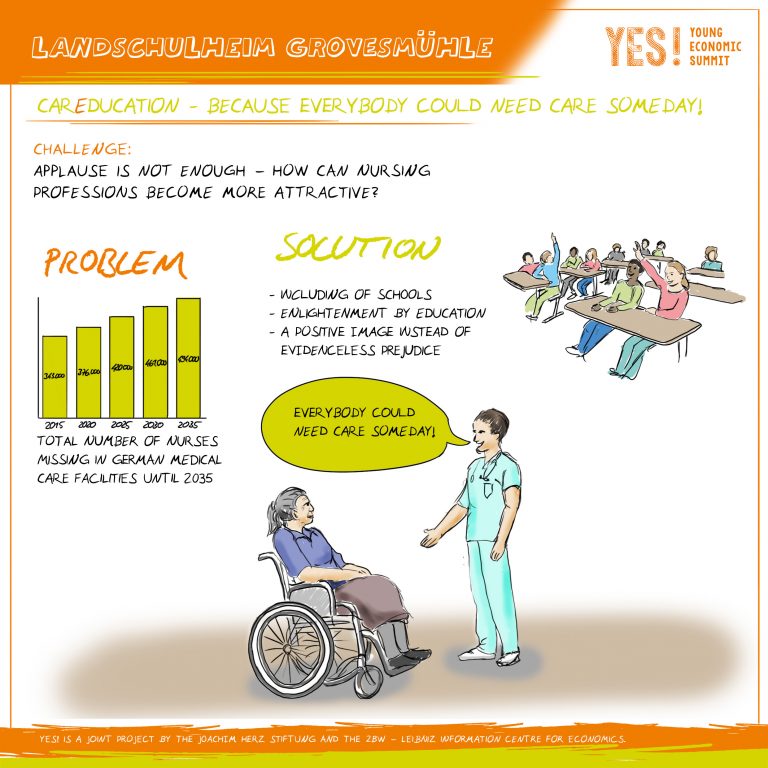
Mit dem Gewinnerteam des „Best Scientific Analysis“-Awards des Landschulheims Grovesmühle wurde eine weitere Idee ausgezeichnet, bei der es um Aufklärung der jüngeren Generation geht. Sie entwickelten mit „CarEducation“ – gesprochen Care Education – Unterlagen für Projekttage an Schulen, mit denen Lehrkräfte ihre Schüler:innen über die Arbeit in Pflegeberufen informieren können. Das Thema der Gruppe wurde von Michaela Fuchs und Julia Lang vom IAB Institut für Arbeitsmarkt- und Berufsforschung gestellt. Das Team wurde insbesondere für ihre detaillierte Auseinandersetzung mit den Arbeitsmarktdaten und ihren entsprechenden Schlussfolgerungen ausgezeichnet.
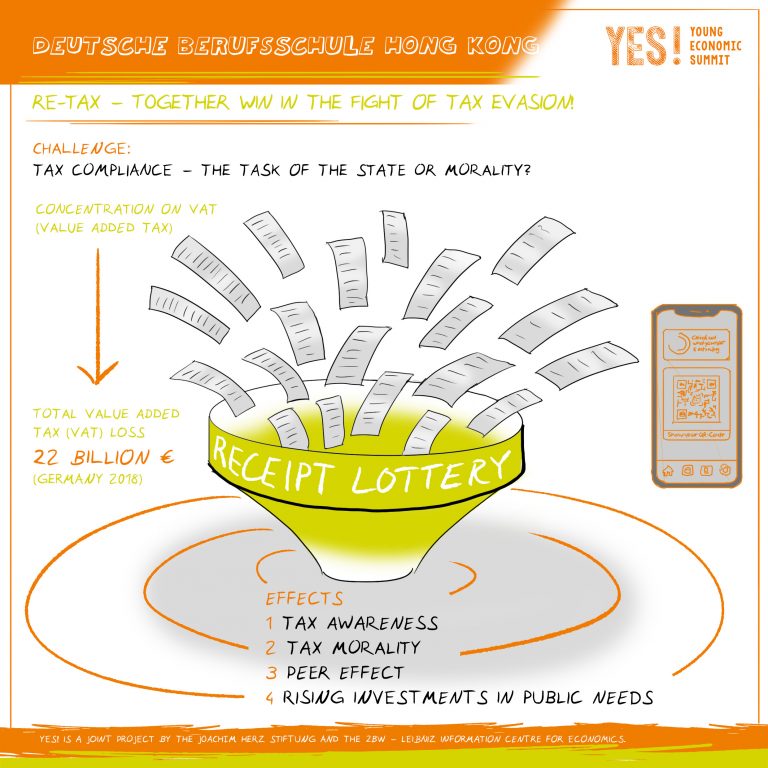
Das zweite Schulteam, das für seine wissenschaftliche Analyse geehrt wurde, war die Deutsche Berufsschule Hong Kong. Ihr Thema von Dominika Langenmayr und Philipp Krug von der Katholischen Universität Eichstätt-Ingolstadt lautete: „Tax compliance – the task of the state or morality?“ Sie analysierten den Verlust an Steuereinnahmen, der dadurch entsteht, dass kleinere Unternehmen wie Bäckereien nicht jeden Verkauf über die Kasse abrechnen. Mit einer Lotterie, bei der man über einen Code auf dem Kassenbon große Gewinne bekommen kann, wollen sie diese Steuerverluste minimieren.
Integration von Geflüchteten bleibt ein Thema
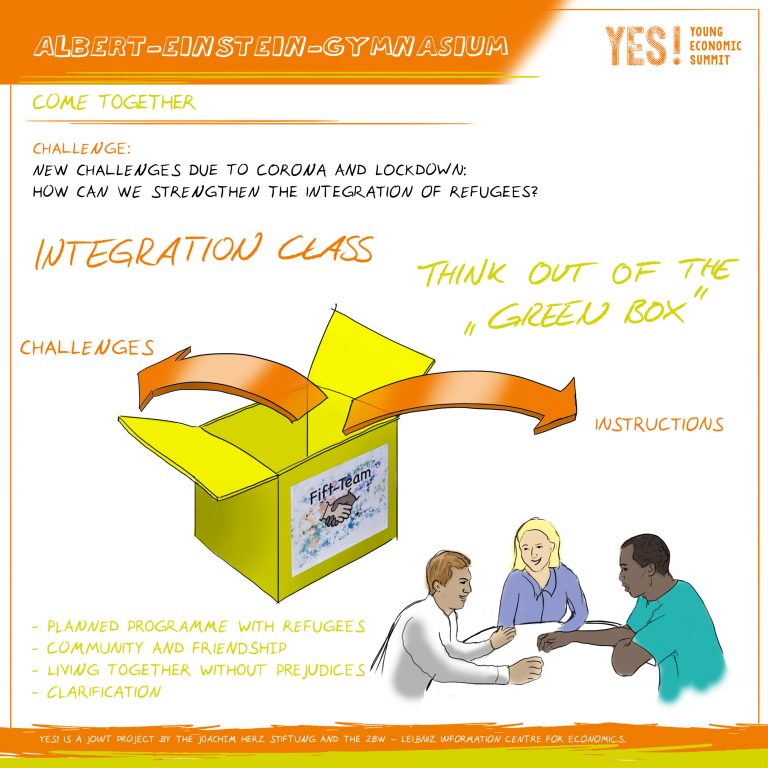
Auch wenn die Bilder der großen Massen an Geflüchteten auf ihrem Weg nach Deutschland schon ein paar Jahre her sind, bleibt die Integration dieser Menschen ein Thema – und nicht nur beim YES!. „New challenges due to Corona and lockdown: How can we strengthen the integration of refugees?“ fragten Paul Berbeé und Katia Gallegos Torres vom ZEW – Leibniz-Zentrum für Europäische Wirtschaftsforschung. Die Gruppe des Albert-Einstein-Gymnasiums aus Frankenthal entwickelte darauf unter dem Slogan „Come Together“ eine Box mit Anleitungen zu Aktivitäten. Sie soll als Startpunkt dienen, dass sich einheimische Jugendliche und Geflüchtete treffen und gemeinsam ihre Freizeit gestalten, um die Integration voranzutreiben. Dieser Lösungsansatz wurde mit dem dritten Platz belohnt.
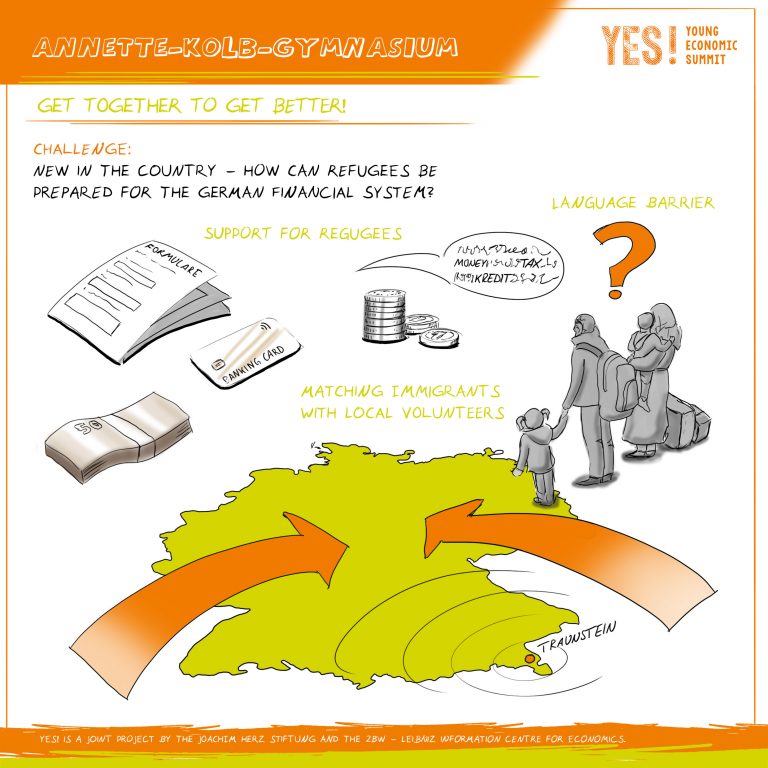
Zweitplatzierte wurde das Annette-Kolb-Gymnasium. Bei ihnen hieß die Idee „Get ToGether to get better.“ Ehrenamtliche Menschen und Geflüchtete sollen sich über ihre Plattform registrieren und werden über einen Algorithmus zueinander passend zugewiesen. Neben der Unterstützung durch Ehrenamtliche bei finanziellen Fragen, wie z.B. Verträgen, soll sich durch weitere Aktivitäten eine Gemeinschaft bilden.
Familienplanung ohne Karriereknick
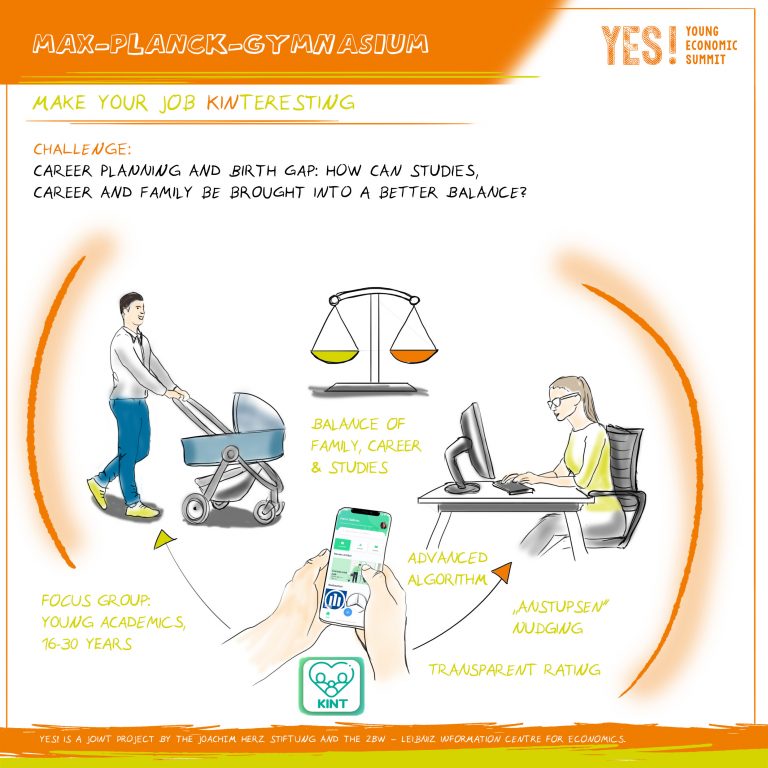
Eine Nische bei den Jobsuchmaschinen und Geschäftsnetzwerken sah das Gewinnerteam des Max-Planck-Gymnasiums aus Gelsenkirchen: „Make Your Job KINTeresting / An app providing jobs while acknowledging the difficulties of having a family.“ Sie befassten sich mit dem Thema „Career planning and birth gap: How can studies, career and family be brought into a better balance?“ von Daniel Kamhöfer (Düsseldorf Institut für Wettbewerbsökonomie (DICE)) und Matthias Westphal (RWI – Leibniz Institut für Wirtschaftsforschung). Bei dem vorhandenen Angebot an Plattformen kam aus ihrer Sicht die Familienfreundlichkeit zu kurz. Deshalb entwickelten sie die Idee einer App „Kint“, über die Jobsuchende gezielt nach Unternehmen und deren Stellenangeboten filtern können, die anhand verschiedener, familienfreundlicher Kriterien bewertet sind.
Alle Gewinnerteams des YES! Deutschland werden wir gegen Ende des Jahres bei der digitalen Preisverleihung durch das Bundesministerium für Wirtschaft und Energie wiedersehen.
2021 – ein breites Spektrum mit einem gemeinsamen Nenner
Über 80 Forschende arbeiteten in diesem Jahr mit 72 nationalen und internationalen Schulteams. 46 Themenvorschlägen wurden von unseren Partnerinstituten eingereicht, deren Zahl in diesem Jahr auf 25 anstieg. Fragen rund um Pflege, Integration, Steuerpolitik, Mobilität, Umweltprobleme, Digitalisierung und den Arbeitsmarkt, um nur ein paar Stichpunkte zu nennen, luden die Teams dazu ein, ihre eigenen Ideen zu entwickeln.
Bei all den verschiedenen Ansätzen gibt es im YES! über all die Jahre immer wieder Schwerpunkte bei den Lösungsansätzen. Mal waren es Apps, mal waren es Gütesiegel. 2021 tauchte immer wieder schulische Bildung auf. Viele Teams waren der Meinung, die Lösung ihres Problems läge in der Aufklärung ihrer Generation – so wie es auch beim Team des Landschulheims Grovesmühle oder auch bei der South Forsyth High School als Preisträger der Fall war. Wir sind jedenfalls schon gespannt, wohin uns die Reise im kommenden Jahr führen wird.
2022 – International und hoffentlich wieder persönlich
Im nächsten Jahr wird es, so hoffen wir, wieder anders und zwar zurück zu persönlichen Treffen bei unseren Finalentscheidungen. So sehr wir die digitale Variante des YES! vorangetrieben haben, bleibt für uns immer noch der direkte Kontakt mit den Jugendlichen, den Forschenden und den Expert:innen bei unseren Veranstaltungen etwas Besonderes.
International werden wir durch die Förderung des Bundesministeriums für Bildung und Forschung für unser Projekt YES! Bridge erstmals eine Veranstaltung außerhalb Deutschlands durchführen. Fünf Teams aus Großbritannien werden ihm Rahmen der Wissenschaftsdiplomatie von Forschenden betreut und für ihr eigenes Finale vorbereitet. Die beiden Gewinnerteams dürfen dann im September zum großen Finale, wo dann auch wieder drei Teams aus den USA teilnehmen dürfen.
2021 war wieder eine Saison voller neuer Herausforderungen. Was aber stets bleibt, ist unser Dank an die Schulteams, die Lehrkräfte, die Forschenden, die Expert:innen – an alle, die uns mit ihrem Zuspruch so sehr unterstützen.
Für uns als Team beginnt nun schon wieder die Vorbereitung auf das neue Jahr. Mal sehen, was alles anders wird.
Euer YES!-Team
2020
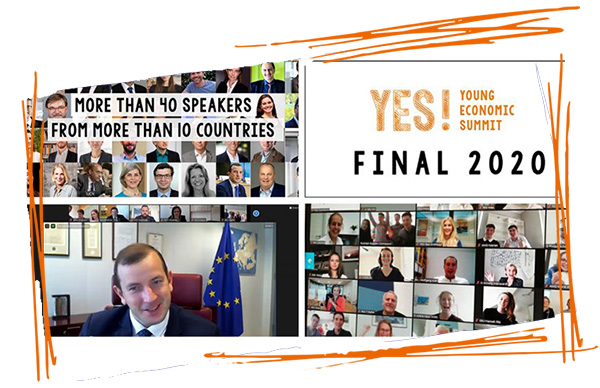 Wie für alle war auch 2020 ein besonderes Jahr für das YES!. Wir standen vor der Herausforderung, einen digitalen Wettbewerb durchzuführen. Und wir haben es geschafft mit Hilfe von hervorragenden Teams, ihren Ideen und vieler hochrangiger und prominenten Expert:innen beim Bundesfinale. Mehr lesen.
Wie für alle war auch 2020 ein besonderes Jahr für das YES!. Wir standen vor der Herausforderung, einen digitalen Wettbewerb durchzuführen. Und wir haben es geschafft mit Hilfe von hervorragenden Teams, ihren Ideen und vieler hochrangiger und prominenten Expert:innen beim Bundesfinale. Mehr lesen.
YES! 2020
Das digitale Finale 2020 – ein Dankeschön an alle
2020 war ein Jahr der ersten Male: spontane Umstellung auf rein digitale Kick-Offs und Fachgespräche, digitale Regionalfinale, digitales Finale, so viele nationale und internationale Sprecherinnen wie nie zuvor und die Keynote-Ansprache eines EU-Kommissars. Ein gutes halbes Jahr voller neuer Herausforderungen gipfelte in einem fulminanten 3-Tage-Event, bei dem wir wieder inspirierende Ansätze hörten und sich unsere Schulteams hoch motiviert den kritischen Fragen der Expert*innen stellten.
Wie kann man eine Veranstaltung wie ein YES! Finale in ein erfolgreiches digitales Format bringen, wenn doch genau das, was fehlen würde, was den Event ausmacht: der direkte Austausch zwischen den Teams und den Expert*innen, die vielen Gespräche in den Pausen und das Gemeinschaftsgefühl in einem großen Saal?
Kurze Antwort: Mit viel Vorbereitung, einem souveränen Moderationsduo, interessierten Expert*innen aus den unterschiedlichsten Ländern und vor allem mit Schulteams, die leidenschaftlich ihre Ideen präsentierten und vor allem an den Vorschlägen der anderen Teams interessiert waren.
An allen drei Tagen hatten wir mehr als 100 Personen gleichzeitig in unserer Videokonferenz. Ein ständiges Kommen und Gehen der Expert*innen, die sich zu ihren verschiedenen Sessions eingewählten, Präsentationen teilen, Introvideos einspielen, Countdowns einblenden, auf den Zeitplan achten – es gab viel zu tun für uns im Hintergrund.
Glücklicherweise hatten wir mit Emily Johnston und David Patrician ein Moderationsduo am Start, das nicht nur souverän durch das Programm und die Diskussionen führte, sondern dabei auch locker und unterhaltsam organisatorische Pausen füllten. Jetzt kennen wir auch den ein oder anderen australischen und amerikanischen Witz.
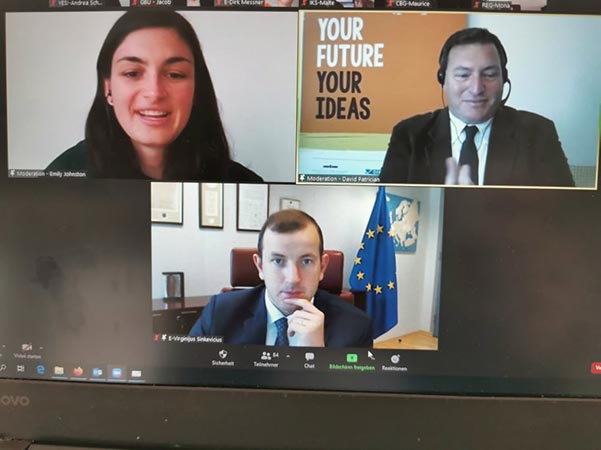
Virginijus Sinkevičius (u.) mit unseren Moderatoren Emily Johnston und David Patrician.
Für uns war 2020 auch besonders, weil wir so viele Expert*innen wie noch nie für das Finale gewinnen konnten – durchaus eine positive Seite, die wir der digitalen Variante zuschreiben dürfen. Unser Highlight war natürlich die Keynote-Ansprach von Virginijus Sinkevičius, dem EU Kommissar für Umwelt, Meere und Fischerei. Er betonte in seiner 10-minütigen Rede, dass gerade das Engagement der Jugendlichen einen großen Anteil daran hat, weshalb die Kommission den „European Green Deal“ ins Leben gerufen hat.
Mehr als 40 Expert*innen aus mehr als 10 Ländern
Auch darüber hinaus waren wir sehr begeistert, wie viele hochrangige Personen sich unserer Einladung angeschlossen haben, um mit den Jugendlichen zu diskutieren. Von Ministerien über internationale Organisationen wie die OECD, der WTO und die EU, die Leitungen verschiedener nationalen und internationalen Behörden wie der European Environment Agency und dem Umweltbundesamt, aus Unternehmen und Verbänden und aus der Forschung – wir hatten die ganze Bandbreite dabei in diesem Jahr. Und wir hoffen natürlich, dass sich das in den kommenden Jahren auch im persönlichen Format vor Ort weiterführen lässt.
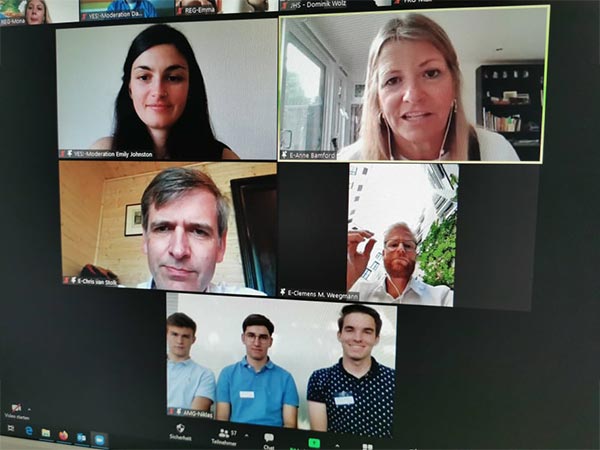
Es wurde viel über gerechte Verteilung der Kitaplätze gesprochen zwischen dem zweitplatzierten Team des Albertus-Magnus-Gymnasiums und Prof. Bamford (r.o), Christian van Stolk (li.m) und Clemens Weegmann (r.m). Und Emily (li.o) hatte alles unter Kontrolle.
All das wäre aber wenig erfolgreich geworden, wenn nicht die YES!-Schulteams so eifrig, flexibel und ausdauernd mit dabei geblieben wären – und zwar nicht nur über die letzten Monate, sondern insbesondere auch während der drei Tage des Finales. In Unterrichtszeiten, die mit verpassten Stoff von vor den Sommerferien und vorsorglich so viel Neuem wie möglich vollgepackt sind, ist das umso bewundernswerter.
Die Teams waren bestens vorbereitet, hatten Präsentationen zeitlich genau abgestimmt, das Feedback aus den Regionalfinalen eingebaut und zeigten sich in den Diskussionen für die kritischen Fragen gewappnet. Und diese Fragen kamen auch von den anderen Teams, die konzentriert zugehört hatten.
Am Ende musste aber natürlich abgestimmt werden. Bei der Verkündung der jeweiligen Favoriten jedes Teams zeigte sich schon, dass viele starke Lösungsideen vorgestellt worden waren. Als Siegeridee setzte sich dann „Lausitz with future?! – Your decision!“ durch. Das Team des Martin-Andersen-Nexö Gymnasiums Dresden hatte sich mit dem Thema beschäftigt „Is there a life after coal? Economic development in East German mining regions“ von Joachim Ragnitz und Felix Rösel vom ifo Institut – Leibniz Institut für Wirtschaftsforschung an der Universität München (Standort Dresden). Mit dem Beschluss des Endes des Braunkohleabbaus in Deutschland wurden von der Bundesregierung mehrere Milliarden Euro für die betroffenen Regionen zur Verfügung gestellt. Das Team entwickelte ein Konzept, bei dem die Bevölkerung sehr stark einbezogen werden soll, wenn es darum geht, dieses Geld sinnvoll zu investieren. Im Gespräch mit Klaus Dornbusch, zeigte sich, dass die Jugendlichen aus Dresden einen aus Sicht der Experten wichtigen Ansatz gefunden haben, um die Bevölkerung einzubeziehen und ihr ein Mitspracherecht zu geben.
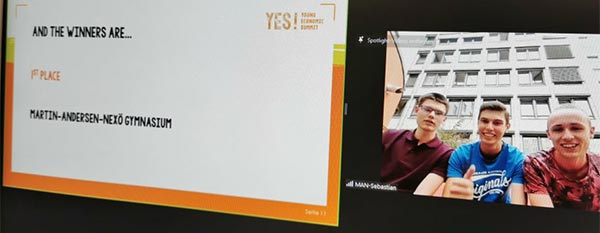
So sehen Sieger aus – online, ohne donnernden Applaus, aber trotzdem hocherfreut.
Den zweiten Platz belegte das Albertus-Magnus-Gymnasium Stuttgart mit ihrer Idee Kitafix – Matching daycare places and children more effectively through an innovative ranking system. Nicolas Fugger und Tobias Riehm vom ZEW – Leibniz-Zentrum für Europäische Wirtschaftsforschung hatten die Aufgabe gestellt: Efficiently organising the allocation of daycare places. Das Team entwickelte daraufhin ein System basierend auf dem Gale-Shapley-Algorithmus und einer eigenen Erweiterung, um eine bessere Verteilung von Kitaplätzen zu erreichen. Als Gesprächspartner hatte sich Professor Anne Bamford, Strategic Education and Skills Director, City of London zugeschaltet, ebenso wie Christian van Stolk, Executive Vice President von RAND Europe und Clemens Weegmann, dem Stellvertretenden Vorsitzenden des Deutschen Kitaverbands in Baden-Württemberg. Sie alle erkannten das Problem und waren überzeugt, dass mit etwas Weiterentwicklung das gezeigte Konzept auch praktische Anwendung finden könnte.
Dritter im Wettbewerb wurde die Idee einer App „YourEco- Swipe for a better tomorrow!“ des Gymnasiums Buckhorn aus Hamburg. Die Herausforderung von Wilfried Rickels vom IfW Institut für Weltwirtschaft lautete: How much CO2 is still allowed to enter the atmosphere, and how do we get it out again?
Das Team entwickelte dazu eine App, die das Verhalten der Menschen hinsichtlich ihrer CO2-Emissionen beeinflussen soll. Mit Dr. Hans Bruyninckx, Executive Director der European Environment Agency, Prof. Dr. Dirk Messner, Präsident des Umweltbundesamts und Dr. Sandeep Sengupta, Global Coordinator Climate Change bei der International Union for Conservation of Nature (IUCN) hatte das Team drei sehr kundige Diskussionspartner, die auf die große Bedeutung dieses Thema hinwiesen und den Ansatz des Teams lobten.
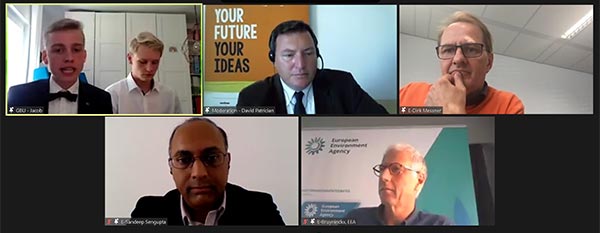
Auch mal eine reine Männerrunde mit dabei. Schüler des Gymnasiums Buckhorn (li.o.) im Gespräch mit Prof. Messner (r.o.), Dr. Sengupta (li.u.) und Dr. Bruyninckx (r.u) – alles im Blick von David (m.o)
Den vierten Platz und damit ein Zeitschriften-Abonnement, erhielt das Team des Lise-Meitner-Gymnasiums aus Maxdorf, das ein Konzept vorgestellt hatte, wie man insbesondere Frauen mit Migrationshintergrund beim Einstieg in den deutschen Arbeitsmarkt unterstützen kann. Der Preis wurde vergeben von Dr. Stefan Empter, dem Vorsitzenden der Stiftung Wirtschaft Verstehen.
Der Sonderpreis „Best-Scientific-Analysis“-Award für die beste wissenschaftliche Herangehensweise an die Problemstellung und den Lösungsansatz ging nach einer Jury-Entscheidung an das Carl-Bechstein-Gymnasium aus Erkner. Sie hatten zu dem Thema How can I imagine my mobility in the city and rural areas without my own car? von Anke Borcherding, Julia Epp, Juliane Haus und Andreas Knie vom WZB – Wissenschaftszentrum Berlin für Sozialforschung gearbeitet. Mit ihrer wissenschaftlichen Herangehensweise zu ihrer Idee eines Bicycle Highways, also einer Fahrradschnellstraße mit Überdachung, Reparaturstationen und weiteren nützlichen Elementen überzeugten sie die Jury.
Die International School of Geneva nahm als internationale Gastschule teil und gewann den YES! International Award. Sie hatten einen alternativen Wohlstandsindikator entwickelt, den RPI Real Progress Indicator, der besserer Einschätzungen zulässt als das Bruttoinlandsprodukt.
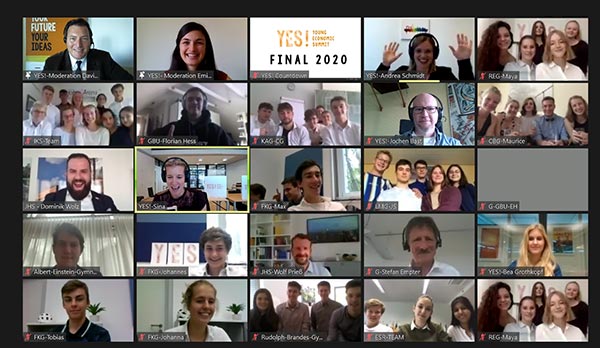
Zeitweise hatten wir vier solcher Bildschirme gefüllt.
2020 wird natürlich auch beim YES! als ein besonderes Jahr in Erinnerung bleiben. Wir werden aber vor allem die schönen Momente im Gedächtnis behalten, die Gänsehautmomente, viel Lachen und sogar die ein oder anderen Tanzrunde vor dem Bildschirm.
Ein großes Dankeschön an alle Lehrkräfte und Teams, an unsere Expert*innen, Forschenden und alle, die uns unterstützt und vertraut haben.
It was a pleasure!
Auf geht’s aber nun ins nächste YES!. Die Anmeldung läuft für 2021, und egal, was uns die kommenden Monate bezüglich der Pandemie bringen werden, wir können es auch digital!
Liebe Grüße
euer YES!-Team
2019
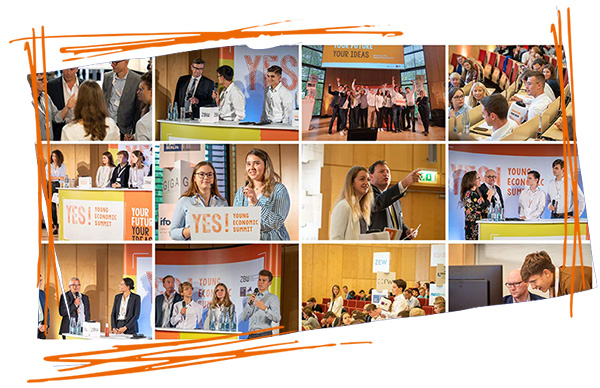
2019 war ein sehr erfolgreiches Jahr für uns, in dem sich mehr als 100 Teams für den Wettbewerb beworben hatten. Zum ersten Mal war unsere fünfte Region „Süd-Ost“ mit neuen Partnerinstituten wie dem ifo Institut und der Katholischen Universität Eichstätt-Ingolstadt.
2019
It wasn’t sunny outside, but inside, on stage and in the audience, all was bright and ready for the first day of the 2019 National Final. 7 teams presented their ideas, discussed them with experts and did a great job promoting their solutions.
Our two moderators, Svenja Heber and David Patrician, welcomed the students, experts, guests, and many researchers, who also joined the summit to learn about the other ideas and support their teams.
After a brief introduction by Meinhard Weizmann, the Managing Director of the Bucerius Law School, where the final was hosted, Wolf Prieß, Director Program Area Economics at the Joachim Herz Stiftung and Willi Scholz, Project Lead of the YES! at the ZBW – Leibniz Information Centre for Economics, the hosts explained the rules for the summit.
This year, for the first time, an extra award is handed out. A jury of experts takes a close look at the “Best Scientific Analysis” of the topics by the teams. The winning team will then also present the idea at the Federal Ministry for Economic Affairs and Energy in Berlin.
Now, all was set, and the first team was asked to take the stage and present their idea for a fair society.
Improving equality of opportunities with My2tor was the intention of the team Robert-Schuman-Gymnasium from Cham. Their idea was to create a system where students help younger students that have a social disadvantage because of their family situation.
The experts to discuss this idea were Annika Johnson from the University of Bristol and Wiebke Weger, Interims manager, who pointed out that there are very positive aspects of the idea, but they also acknowledged that it is difficult to bring such a project into life.
The second team from Gymnasium Köln-Pesch took aim at the urban-rural divide with their idea of Shared Remote Offices – enable well-paid jobs in rural areas. They introduced their own designs for such a house, including calculations, different options of use as well as their app that should help people in rural areas to connect, not only for working but also on the cultural side.
Their discussants were Shelly Steward from The Aspen Institute, Stefan Profit from Federal Ministry for Economic Affairs and Energy. They critically pointed out issues like the financing of their idea, but also praised this positive approach of the team.
After the first break, our special guests from the UK took over the microphone. This year, the YES! cooperated with the economics department of the University of Bristol. Two school teams worked out their own ideas similar to the German test. Due to a strike of the pilots, one team couldn’t make it to Hamburg. So only the team of Malvern College presented their solution to the issues that arise with a growing gig economy: SWIGE – Saving the gig economy
They discussed their idea of an app that focuses on a major issue of the gig economy with Florentyna Farghly from The Behavioural Insights Team in London and Shelly Steward from The Aspen Institute in Washington. The idea was to make the gig workers aware of the need for saving money for when they are old. In the discussion, the experts pointed out that the idea is on spot of a critical issue, but they also noted that the legal framework, for example, needs to support the gig workers better even to have a chance to save money in these often low wage jobs.
They did a great job. Since the team didn’t go through the entire competition as the German teams, they were not eligible for any votes.
With packages and the delivery problems of the last mile, we continued the presentations. The team Gymnasium bei St. Michael from Schwäbisch-Hall developed a concept they called P-Box – For Green Delivery.
They discussed their idea with Katja Diehl, VCD Verkehrsclub Deutschland e.V., Carsten Hansen, Bundesverband Paket und Expresslogistik e. V., and Rolf Meyer, Meyer & Meyer Holding SE & Co. KG.
After the lunch break, we learned what the word Upgreening? means. It’s the idea of the team RBZ Wirtschaft . Kiel to change the traffic in the cities of tomorrow. They want to consult companies on who the improve the way employees come to work or travel during work time in matters of health, environment and motivation.
In a lively discussion, Katja Diehl, Hans Haans from Tilburg University and Stefan Profit exchanged arguments and ideas with the team about their network, their future plans and their marketing efforts.
Next up was the question how manage the integration of refugees into your society. REFUCATION – Integration of Refugees through Education was the answer of the team Albertus-Magnus-Gymnasium Stuttgart. They want students to help refugees as part of their school agenda to improve their skills in German and maths because many refugees that start an apprenticeship often fail the theoretical exams due to missing language skills.
Jill Addo from the Federal Employment Agency, Thomas Bauer from the RWI – Leibniz Institute for Economic Research, and Panu Poutvaara, Ludwig-Maximilian Universität München & Sachverständigenrat deutscher Stiftungen für Integration und Migration, joined the stage to discuss this idea. They acknowledged the importance of such a plan and suggested several aspects to look for.
Last on the stage for the first day was a team that tackled an issue that relates to all of us. PSEC-Reform – Pension Stabilization Equity Change aims at solving the problems that come with the demographic change. They came up with calculations for a new formula to stabilise the pension system.
On the stage, our experts Florentyna Farghly, Stefan Profit, and Gert Georg Wagner, Chairman of The Social Advisory Council (Sozialbeirat der Bundesregierung) took a close look at the concept, going through the numbers and graphics and asking detailed questions to the team.
On day two, the moderators Svenja Heber and David Patrician welcomed the first team of the day to the stage. The task: How to fight climate change? The team: Werner-Heisenberg-Gymnasium Weinheim. The idea: GreenPay – a private incentive system for a sustainable future
They presented their idea of a point collecting system that awards buying eco-friendly products and how they rolled out test runs in local stores.
They were joined by Peter Byck from the Arizona State University, Andreas Lange from the University Hamburg and Holger Thiele from the University of Applied Science Kiel. They all curiously asked questions on the verification of the products’ eco-footprint and praised the actions the team already had taken.
Up next was also a climate change topic and how to change our behaviour. This time a team from the north, Richard-Hallmann-Schule Trappenkamp that came up with a clever slogan for their idea: Be schlau, eat less cow
They planned to let young volunteers go to school, use the team’s teaching material to inform elementary school kids about the effect livestock farming has for the climate change.
Peter Byck, Sarah Smith from the University of Bristol and Holger Thiele came up to the stage to share their views on this idea. They recognised the approach of addressing elementary children, but also noted the difficulties to teach the kids the whole story and not leaving parts out since sustainable livestock farming can significantly contribute to reducing CO2 as well.
And now something completely different: Banks. Or who needs banks? That was the questions the team Martin-Andersen-Nexö from Dresden deal with. They believed in A Safe Bank Account For Everyone, an account with the European Central Bank for every citizen, where the money is save, and no bank can speculate with it.
A controversial discussion followed with Florentyna Farghly, Jens Reich from the Deutsche Bundesbank and Cyrus de la Rubia from the Hamburg Commercial Bank AG. The asked many questions on their proposal, pointing out critical aspects as well as a strong acknowledgement that this approach was really “out of the box”.
Another turn took the next presentation on a topic on why people lie. The team Berlin International School addressed this issue with a concept they believe can help victims of sexual harassment: ProtectMe – An App Helping to Protect Victims of Sexual Abuse
The app allows people to find support and information when they were sexually abused – in an anonymously way the lower We welcomed on stage for the discussion Sigrid Richter-Unger, Deutsche Gesellschaft für Prävention und Intervention bei Kindesmisshandlung, -vernachlässigung und sexualisierter Gewalt e.V., and Mechthild Wolff, Hochschule für angewandte Wissenschaften Landshut. They both pointed out the importance of this issue, applauded the approach, but also reminded the team that offering such a service is very costly, and it would be sensible to reach out to potential partners.
The last session of the day after lunch started with a new idea on how the change the transportation system in Germany. Team Burg-Gymnasium Bad Bentheim promoted their idea of H like hope – H like H-bike – bikes powered by hydrogen that let users cover longer distances, but had several advantages compared to E-bikes.
They engaged in discussion with our experts Katja Diehl and Heinrich Klingenberg from hySOLUTIONS GmbH. Using hydrogen was to them not the first thought, but they both found the concept innovative and arriving at the right time.
The final team of the summit came from the Engelsburg Gymnasium Kassel. With their platform/app Integra, they want to tackle the problem of bringing refugees to the labour market. Again, the moderators invited Jill Addo, Thomas Bauer and Panu Poutvaara to the stage to share their thoughts in this idea. In a detailed discussion they asked for where the app should be in the market, the legal framework, and how this could benefit the German job market.
After a short break and a brief reminder on how the voting process works, the teams delivered their pitches, one-minute-presentations, in reverse order to prepare everyone as good as possible for the upcoming vote.
The jury for the new award had a tough time finding a winner “Best Scientific Analysis”. They decided for the RBZ Wirtschaft . Kiel because they did a good analysis, did surveys and use this data to change behaviour.
The fourth place and with it a one-year subscription of the magazine „Enorm“ also went to the team RBZ Wirtschaft . Kiel. It was sponsored by the „Stiftung Wirtschaft Verstehen“, represented by Dr. Stefan Empter and Prof. Dr. Helga Hackenberg.
The three winners were announced by Dr. Nina Lemmens, member of the executive board of the Joachim Herz Stiftung.
The third place went to Gymnasium bei St. Michael from Schwäbisch-Hall with the P-Box idea. Second in the vote was Gymnasium Köln-Pesch and their concept of remote offices in the rural areas.
First place winners came from Weinheim. The team of the Werner-Heisenberg-Gymnasium collected the most points in the vote.
All four teams will go to Berlin to present their ideas at the Federal Ministry for Economic Affairs and Energy and to receive their official award.
We, the organising team of the YES!, had a blast this year. It was the largest YES! ever, most registrations, most teams in the competition, most partners, most topics and most of all: Inspiring ideas from young people that presented their ideas with scientific accuracy, spirit and passion.
Thanks for all of this to the students, teachers, researchers and partner institutions for the year-long support
2018
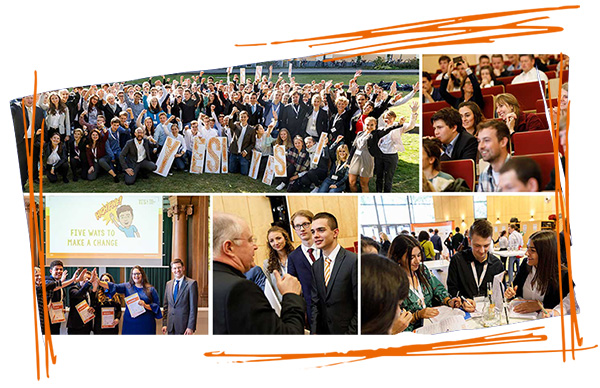
2018 war unser größtes YES! bis dato. Erstmals nahmen Teams aus vier Regionen teil. Die Regionen Ost und West kamen hinzu und mit ihnen auch neue Partnerinstitute. Das Finale fand erstmals in der Bucerius Law School in Hamburg statt.
YES! 2018
It’s the first day of this year’s final – a new location, teams from four different regions, two moderators and twelve solutions that have made it through the regional finals.
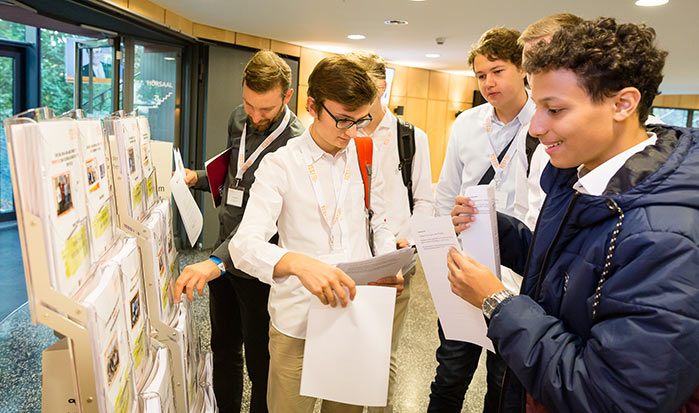
The teams prepared themselves with printouts of the solutions for the upcoming presentations. Photo: (c) YES!
Conny Czymoch and David Patrician, our moderators, gave a warm welcome to the participants and forwarded the greeting by Peter Altmaier, the Federal Minister for Economic Affairs and Energy, the patron of the YES!. In his written statement, he stressed the importance of the economic education for students and thanked all the scientists, teachers and students for the efforts and engagement.
To be the first team to come onto the stage is always tough, but the group of the Carl-Maria-von-Weber Gymnasium from Eutin did a great job promoting their idea. They had chosen the topic of “Why don’t they care? Nudges to improve willingness to help?” by Lena Detlefsen and Katharina Lima de Miranda from the IfW Kiel. Their idea focused on teaching younger children how to make the first response in case of an emergency. Their concept of a seal for schools to provide such seminars for their students was strongly supported by one of the experts, Bernd W. Böttiger. Prof Böttiger of the University Hospital of Cologne emphasised that such a concept has the potential – if properly implemented – to save thousands of lives each year. The second expert, Karsten Schmidt of the Roskilde University and an expert on nudging, indeed saw the potential as well, but also recommended some improvements on the nudging side of the project.
Second on stage was a team from the new region East. The Alfred-Nobel-Gesamtschule Potsdam wants to involve young school students in research. Their supporting scientist, Henry Sauermann of the ESMT Berlin, proposed the topic “Involving Citizens in Research: Improving Science and Society”. The team came up with the concept of an online platform, directed to teachers and students, that include citizen science projects that are suitable for using them at school. The two experts were Katrin Vohland of the Museum for Natural Science in Berlin and Ole Wintermann of the Bertelsmann Stiftung. They both recognised the positive elements of the idea immediately, but also recommended some improvements to benefit from the existing platforms.
„Sustaining the World’s Oceans“ by Christine Bertram of the IfW Kiel was the topic to talk about after the first break of the day. The team of the Alexander-von-Humboldt-Schule Neumünster introduced their booklet for children with some animal characters to teach young children how to behave correctly to prevent further pollution of the seas. Our experts for this session, Mirjam Steffensky from the IPN – Leibniz Institute for Science and Mathematics Education, and Achim Lauber from the JFF – Institut für Medienpädagogik, expressed their support for the booklet right away. They pointed out that such a brochure is not designed to solve a problem like the pollution of the oceans, but a good starting point to educating younger children and thus being an essential step in the right direction.
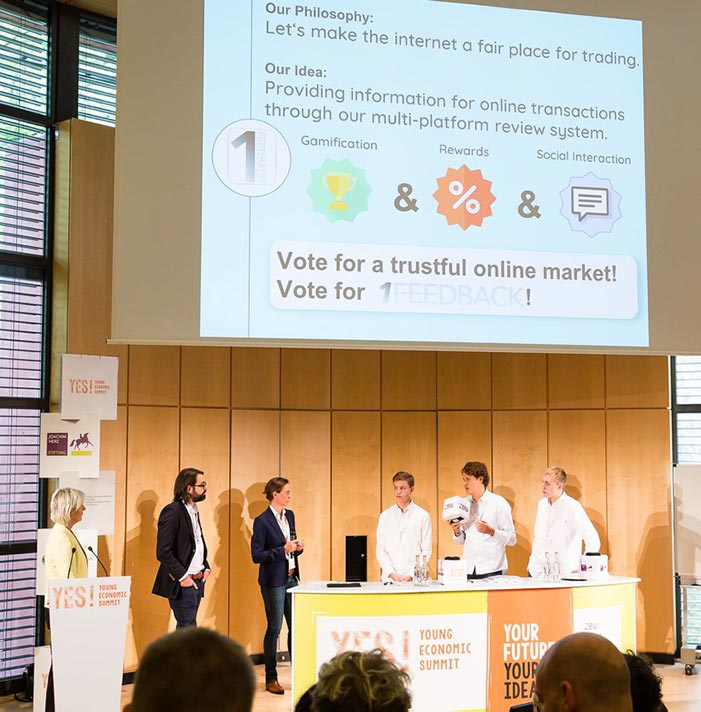
The team Cecilien-Gymnasium Düsseldorf discussed their solutions with our experts Wiebke Weger and Lars Müller. Photo: (c) YES!
The fourth proposal of the morning was presented by a team from the region South-West, Otto-Schott-Gymnasium Mainz-Gonsenheim: “Citizen’s Assistant – Improve Efficiency in Public Administration”. The idea is a response to the challenge by Sebastian Blesse and Thomas Schwab of the ZEW called „eGoverning Germany: The future of public administration„. In a lively presentation, the group outlined their expectations for a service-oriented citizen service by the public administration. This time, three experts commented on the solution. Nuria Villanova of the OECD, Dirk-Hinnerk Fischer of the Tallinn University of Technology and Thomas Langkabel of the Initiative D21. They all supported the basic idea of making public services more available in a digital fashion but also agreed that it is a long way to go to do this change.
Next on stage after a relaxing lunch break was the team Cecilien-Gymnasium Düsseldorf. They tackled the problem of lack of trust in shopping reviews on the Internet, as described in the challenge “Transactions via the Internet – How can trust be built?” by the researchers Rebekka Rehm and Clemens Recker of the iwp Institute for Economic Policy at the University of Cologne. Their answer to this question is called “1Feedback”, a system that combines writing reviews of purchases across the Internet along with a gamification aspect and a reward system. The experts for this session were Wiebke Weger, an experienced and independent marketing expert, and Lars Müller, CEO of the marketing agency wigital. They were impressed by the presentation of the team, yet they also pointed out how difficult a project like this could be regarding data protection and the interchange between online shops.
“New ways for a future-proof and generation-appropriate care” was the topic provided by Ingo Kolodziej of the RWI Leibniz Institute for Economic Research in Essen. This was the task, and the team of Gesamtschule Waldbröl developed the concept of an online platform where young people get a bounty in various forms to help older adults. Karsten Schmidt of the Roskilde University and Juliane Zielonka of the Techniker Krankenkasse as experts on this topic quickly engaged in a discussion on the pros and cons of the proposal.
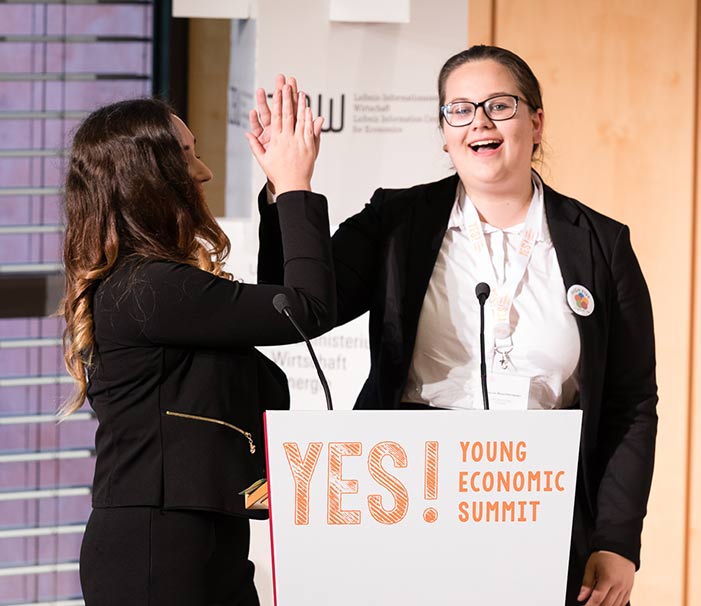
What a way to end a presentation on „High-Five“, the solution proposed by the Fritz-Erler-Schule Pforzheim. Photo: (c) YES!
The final presentation of the first day was left for the team of Fritz-Erler-Schule Pforzheim, and their topic was one that affects a large number of children: “How to combat child poverty and how can children and adolescents be best supported”, which was proposed by Holger Stichnoth of the ZEW Centre for European Economic Research in Mannheim. The team presented their approach “High Five”, which includes activities at schools and the communities to support children that excluded from many activities because their families can’t afford them. The discussants, Dagmar Balve-Hauff of the Federal Ministry for Economic Affairs and Energy, Sabine Hübgen of the WZB Berlin Social Science Centre and Achim Lauber of JFF – Institut für Medienpädagogik, all agreed on the importance of a proposal like “High Five” and to put children in the focus of the project.
What a great Day 1 it was at the YES! 2018 National Final. We certainly enjoyed the presentations, the critical questions both from the experts and the audience and how the presenters found arguments to defend their idea.
After the long first day, the teams returned on Friday morning to the Bucerius Law School to attend the final five presentations. The first team took us to Africa! BBS Burgdorf dealt with the topic “How to Strengthen the Economy in African Developing Countries”, which was proposed by Roland Dörn of the RWI Essen. The solution they came up was an app called “Ubatimu” – an app that should help African farmers, by simulation and gamification, to find the best possible crops and fertilisers for their land. Our experts, Martin Foth-Feldhusen of the GIZ and Holger Thiele of the University of Applied Science Kiel, were critical towards the approach for several reasons but also acknowledged the innovative format of the solution.
Second on stage was the Georg-Büchner-Gymnasium Berlin. By having an interactive presentation of their solution “RSMS – A Better indicator for Economic Forecasting”, the group kept the audience interested in their topic “Sense and Nonsense of Economic Forecasts: Motivation and Methods for macroeconomic Forecasts” by Ferdinand Fichtner of the DIW Berlin. Nora Hesse of the European Commission and Cyrus de la Rubia, chief economist of the HSH Nordbank, both thought that the idea is a good step in the right direction. In a lively discussion, the team responded to the many questions by the audience.
“Promoting financial inclusion: New policies and technological innovations through digital finance”, by Helke Seitz and Tim Kaiser of the DIW Berlin was the next topic on the table. The team of Berlin International School tackled this problem and came up with “Virgo – A Financial Ecosystem Reinventing Microfinance”. This system, based on an app, should enable people in developing countries to get access to finance more easily. Three experts joined the discussion, Cyrus de la Rubia, Nora Hesse and Thorsten Grenz of KIMBRIA. Quickly, an active debate evolved regarding the Virgo system, blockchain technology and microfinancing in general.
The last session before the lunch break circled around the topic “Promoting Digitisation in Business” by Jörg Ohnemus and Steffen Viete of ZEW Mannheim. The team Saarpfalz Gymnasium Homburg developed the concept of “M.I.T. – A Certificate for Digital Skills”, a system of training opportunities for employees. This session was moderated by Susan Djahangard, editor at “Die Zeit”, who welcomed Dagmar Balve-Hauff of the Federal Ministry of Economic Affairs and Energy and Dirk-Hinnerk Fischer of the Tallinn University of Technology. The experts agreed with the team that there is the need for a continuous qualification on the job, but they also saw an already established market in this field.
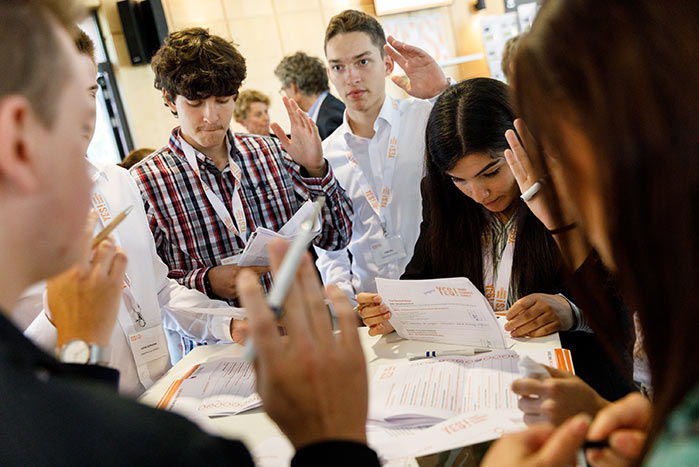
Ranking the solutions at the YES! is not easy, but takes a lot of discussions. Photo: (c) YES!
The final presentation of the YES! 2018 was about “The Facebook Business Model -You are the Product” by Cora-Wacker-Theodorakopolous and Timm Leinker of ZBW Leibniz Information Centre of Economics. The team of Gymnasium Wellingdorf asked themselves what kind of data has Facebook of each user. They used the options Facebook provides of downloading the user’s data and developed the concept of an app to visualise the data to understand more easily. The experts, Anne Riechert of Stiftung Datenschutz and Jil Sörensen of Hamburg Media School, pointed out how important it is to be sensible about the personal data and that such an app could undoubtedly improve the awareness.
Next, after the 1-minute-pitches of each team and a clear instruction on the voting procedures, the announcement of the winners was on the agenda.
Each team ranked the others and distributed 11 points to their favourite, 10 to the next and so on. And, as something new to the YES! in 2018, representatives of each team came to the stage to tell and explain, which team they ranked first. Excitingly, it showed that all the teams did a great job because a great variety of solutions was as the favourite solutions.
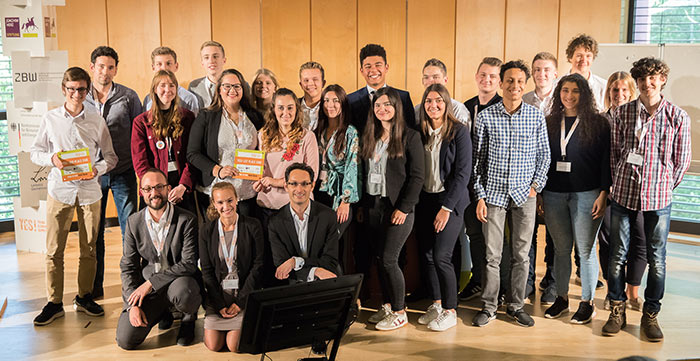
The three winning teams of 2018. Photo: (c) YES!
But not only the large numbers count. And so the winning teams finally were announced. Third place was the group Gesamtschule Waldbröl. The second was Cecilien-Gymnasium Düsseldorf, and the first place went to, drum roll please, Fritz-Erler-Schule Pforzheim II.
After two long days at the final, four regional finals and more than half a year of working with the teams, the organising team of the YES! certainly is happy for the winners, but we also feel with the teams that didn’t make it to the top. However, we know that they worked hard. And the past years have shown to us, that you don’t need to be in the top 3 to have a great idea that can change something.
We thank all of the teams, the teachers, the research institutions and their scientists for their support throughout the year. We are looking forward to coming back again next year, even larger with the fifth region South-East and a true nationwide competition.
2017
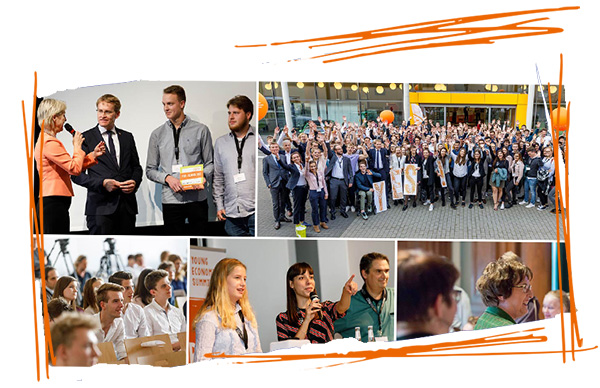
Zum ersten Mal ist das YES! gewachsen um eine zweite Region. Mit dem ZEW – Leibniz-Zentrum für Europäische Wirtschaftsforschung fand das YES! einen hervorragenden Partner in der neuen Region Süd-West.
YES! 2017
The YES! 2017, for the first time, took place in two different regions. While the YES! started in 2015 with teams from the North, in its third rendition, the competition included the region South-West. With the ZEW Centre for European Economic Research as the regional partner, the first of two regional finales took place in Mannheim. The second final was held in Kiel at the ZBW.
The final in Kiel in September was bigger than ever, with 14 teams presenting their solutions on two days, accompanied by national and international speakers who discussed the solutions in every detail.
In the end, a team from the new region won. BBS Wirtschaft 1 from Ludwigshafen created a concept of a „Company Gateway“, which should allow founders to establish a new company with a less bureaucratic burden to push Germany’s entrepreneurship to a new level.
Participating Teams and their solutions
- Albert-Einstein-Gymnasium Ulm: Robots and Energy – New Policies of Taxation
- Albert-Schweitzer-Gymnasiums Dillingen: The Europe Day
- Albertus-Magnus-Gymnasiums Stuttgart: Career Network for SMEs
- Alexander-von-Humboldt-Schule Neumünster: Optional Eco-Donation (OED)
- BBS Wirtschaft 1 Ludwigshafen: Company Gateway for Start-Ups
- Friedrich-List Schule Mannheim: The Nanabox – Natural & Renewable
- Geschwister-Scholl-Gymnasiums Stuttgart: Flux App Reward System
- Heinrich-Heine-Gymnasium Hamburg: Sustainability Kit for Schools
- Helene-Lange-Gymnasium Rendsburg: Land
Investment Revolution – Four Pillar System - Hohe Landesschule Hanau: Politic Future App
- RBZ Wirtschaft . Kiel: E-Parties – I’m E – Try Me!
- Richard-Hallmann-Schule Trappenkamp: MatchED – Matching Education and Digitalisation
- Werner-Heisenberg-Gymnasium Weinheim: The Checkpoint – Prove the Truth
2016
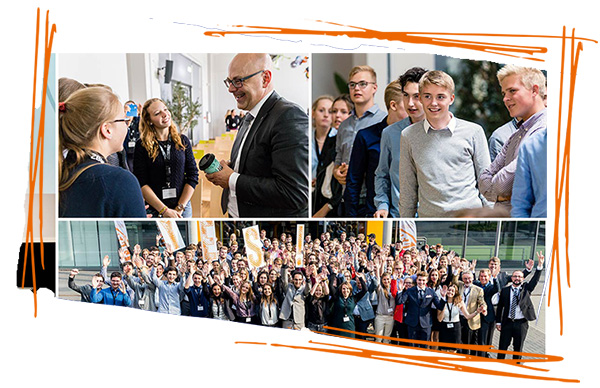
Wenn ein Projekt im ersten Jahr auf so große Resonanz stößt, werden im zweiten Jahr gerne die Erwartungen erhöht. Wieder waren 14 Schulen dabei und präsentierten ihre Ideen im RBZ Wirtschaft in Kiel.
YES! 2016
When a project like the YES! receives such a great response in its first year, the second year is accompanied by some expectations. Again, 14 schools took part and sent their teams up onto the stage at the RBZ Wirtschaft. Kiel. The bar was high, but the students performed at their best and came up with ideas that were well received by the audience, politicians and the experts during the discussions.
This year’s winning solution dealt with the protection of the seas, in particular, with regard to the fishing zones. „eFishient“ – that’s the brilliant name the team of Lernwerft Kiel came up with for their proposal of a system of rotating fishing protection zones in the North Sea.
The runnerup of 2016 was the team Gymnasium Wellingdorf. Their topic was „Libertarian Paternalism and Choice Architecture: Nudging People into the ‚Right‘ direction“ and they developed a solution focused on how to provide bicyclists with more safety in the daily traffic.
The third-place solution dealt with the current immigration wave. The team of the Helene-Lange-Gymnasium Rendsburg sorted out a system of courses for refugees that would enable them to find an easier way to become potential workers in the German labour market.
All in all, the teams exceeded the expectations for the YES! in its second year, providing solutions that would lead to invitations and presentations at large conferences like the Global Solutions Summit in Berlin.
Participating Teams and their solutions
- Alexander-von-Humboldt Schule Einfeld: PPP – Parley-Publish-Pass
- Anne-Frank-Schule Bargteheide: Smart Cities – Blueprint of our Future
- Erenköy Işık High School: House of Cans
- Gymnasium Wellingdorf: More Security on Streets through Nudging
- Heinrich-Heine-Gymnasium Hamburg: Teens for Integration
- Heinrich-Heine-Schule Heikendorf: Worldwide E-Learning at School
- Helene-Lange-Gymnasium Rendsburg: Refugee Integration Course System
- Hermann-Tast-Schule Husum: Bring Sharing into Childrens Consciousness
- Humboldt-Schule Kiel: Network of the Ocean
- Lernwerft Kiel: Marine Temporarily Protected Zones
- Max-Planck-Schule Kiel : Uniform European Migration Regulation
- Peter-Ustinov-Schule Eckernförde: The Reusable Bin
- RBZ Wirtschaft . Kiel: Self-Sufficient Islands Among the City
- Richard-Hallmann-Schule Trappenkamp: Hero Mug – Stop Waste. Enjoy Taste.
- Wirtschaftsgymnasium Kiel: Fair Work Seal
2015
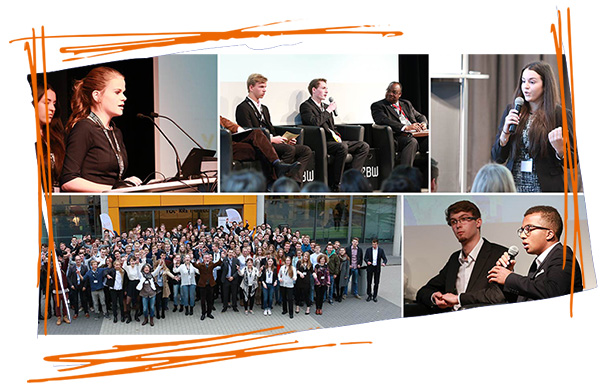
Was wäre anders an einer Lösung zu einem Problem in der Wirtschaft, unserer Gesellschaft und der Umwelt, wenn diese Lösung von Schüler:innen stammte? Wie würden sie das Problem angehen? Was könnten Entscheidungsträger:innen von der Perspektive der Jugendlichen lernen? Wie würden die Schüler:innen von dieser Art von ökonomischer Bildung profitieren?
Kurzum, das waren die Fragen, die dann zur Idee für das YES! – Young Economic Summit führten und 2015 das erste Mal beantwortet werden sollten.
YES! 2015
How different would it be if school students came up with a solution to a problem that affects the economy, the society or our environment? How different would their approach be? What could decision makers learn from this different perspective?
In a nutshell, this is the idea behind the YES! – Young Economic Summit, which took place for the first time in 2015. The ZBW – Leibniz Information Centre for Economics and the Joachim Herz Stiftung organised this summit with teams from 15 school. They were supported by researchers of the IfW Kiel Institute for the World Economy. The teams had to choose from a list of challenges, got introduced to the topics by the researchers and started thinking in their own directions. And the results were astonishing.
The first prize won the team Gymnasium Wellingdorf. Their task was to tackle waste management. Their idea of a deposit system for plastic bags persuaded their fellows at the summit. Instead of buying bags or getting bags for free at stores, they proposed using robust polyester bags in a deposit system.
The second prize went to the team Heinrich-Heine-Schule Heikendorf. Their topic was „Dealing with the Challenges of Urban Development“. The solution they presented a bonus system for public transportation – the more people use it, the cheaper their tickets get.
The third prize winners of the Anne-Frank-Schule Bargteheide demanded an increased spread of the alternative cultivation methods „Push and Pull Technology“ and „System of Rice Intensification“ in order to secure food in a sustainable and agroecological way.
Finally, the public choice award went to Gymnasium Altenholz. Their idea was „A coherent response to migration – Portal Europe“ to effectively counteract information asymmetry between migrants and receiving host countries and to establish an open welcoming culture.
One of the highlights for the winning teams was a meeting with Nobel Laureate Prof. George Akerlof and his son Prof. Robert Akerlof, with whom they discussed their solutions. They both were very impressed and George Akerlof noted: „Young people often have a better view for new ideas and solutions than trained economists.“
The winning teams later received their official awards in Berlin at the Federal Ministry for Economic Affairs and Energy from State Secretary Brigitte Zypries.
Participating Teams and their solutions
- Alexander-von-Humboldt Schule Neumünster: Dealing with Urban Development
- Anne-Frank-Schule Bargteheide: Food Security Through Sustainable Cultivation Methods
- Friedrich-Schiller-Gymnasium Preetz: SAFE – Society Acts for Environment
- Gymnasium Altenholz: A coherent response to migration – Portal Europe
- Gymnasium Wellingdorf: Reduction of Plastic Waste Through a Deposit System for Plastic Bags
- Hermann-Tast-Schule Husum: European Point System
- Hebbelschule Kiel: How to negate social disparities in Europe
- Heinrich-Heine-Schule Heikendorf: Revolutionising Public Transport And a Bonus System for Bus Tickets
- Helene Lange Gymnasium undGymnasium Kaiser-Friedrich-Ufer Hamburg
- Helene-Lange Gymnasium Rendsburg: Monetary Policy- Lessons learned from the Crisis and the Post-Crisis Period
- Humboldt-Schule Kiel: Stopping the Value Decreasing Event
- Max-Planck-Schule Kiel: Fiscal consolidation
- Richard-Hallmann-Schule Trappenkamp: EU Asylum Visa
- RBZ Wirtschaft . Kiel: Promoting Social Mobility
